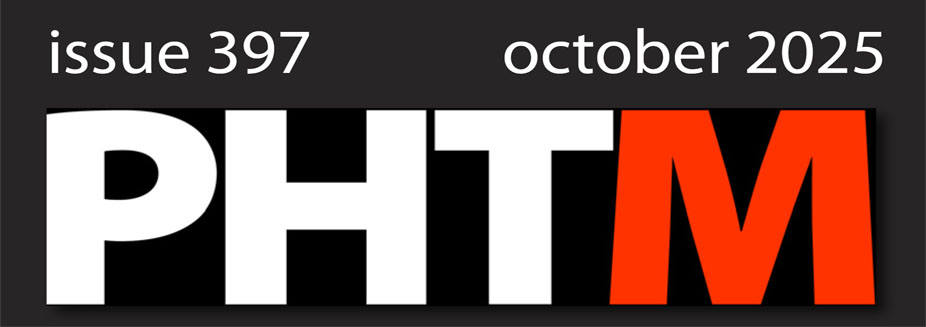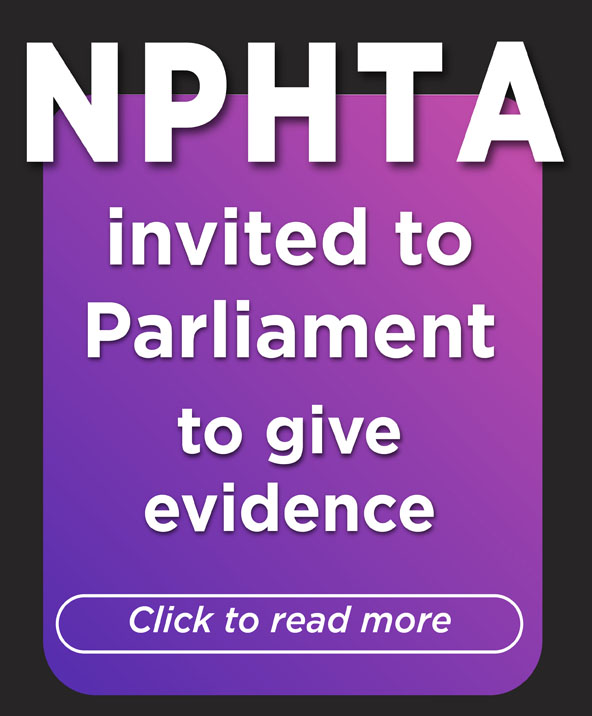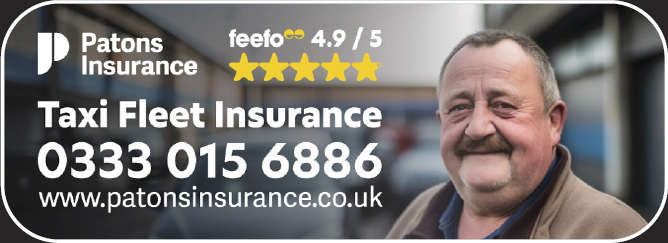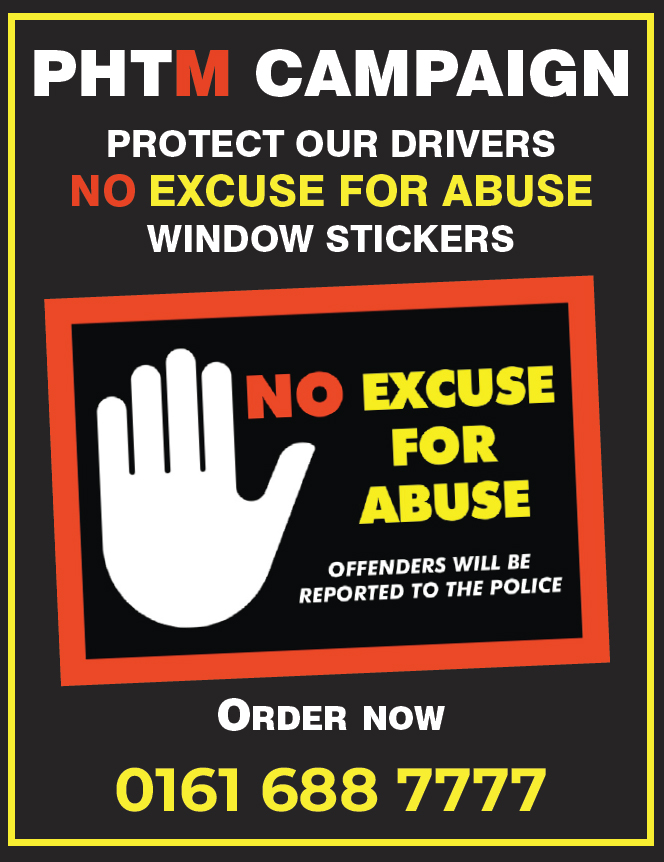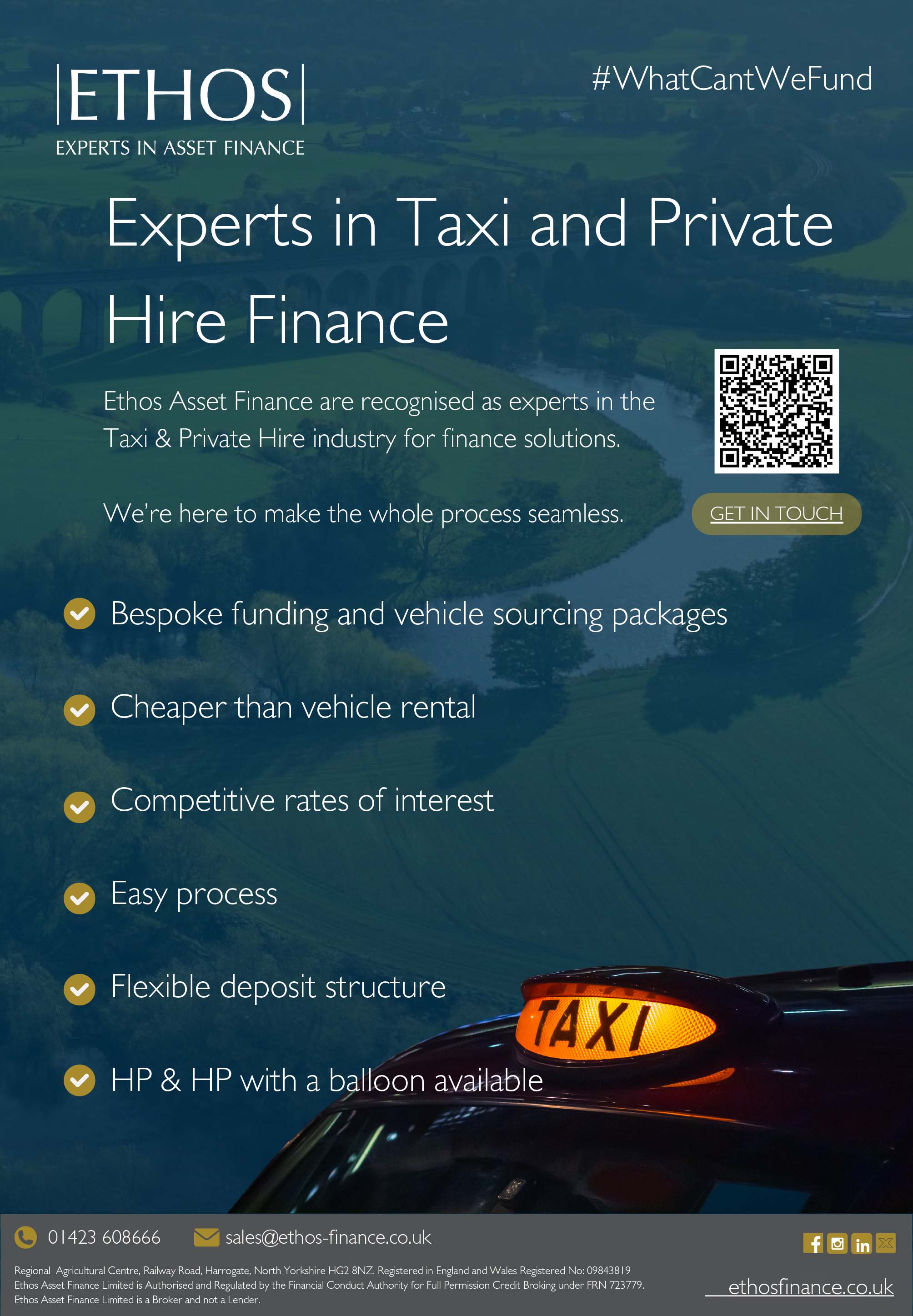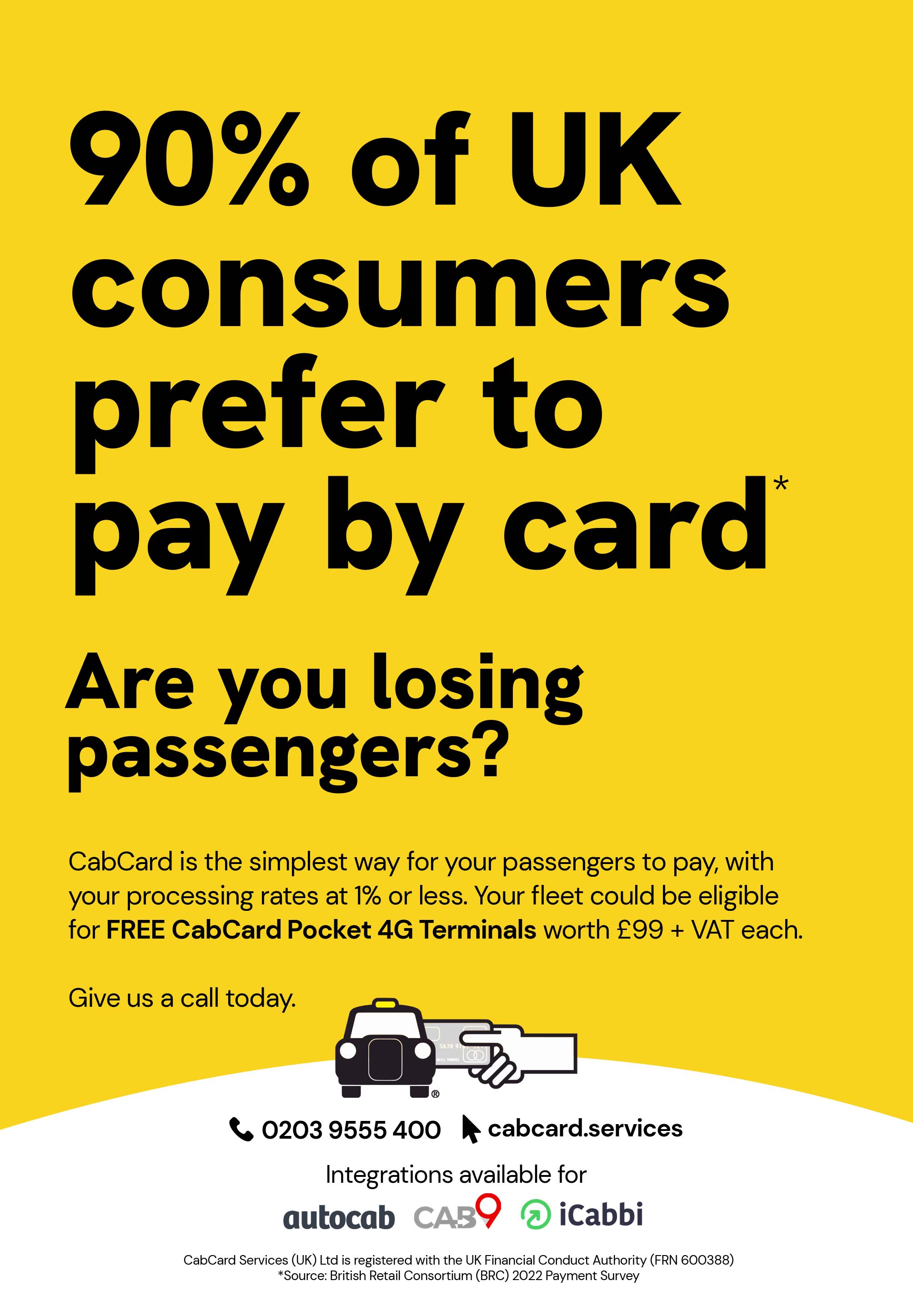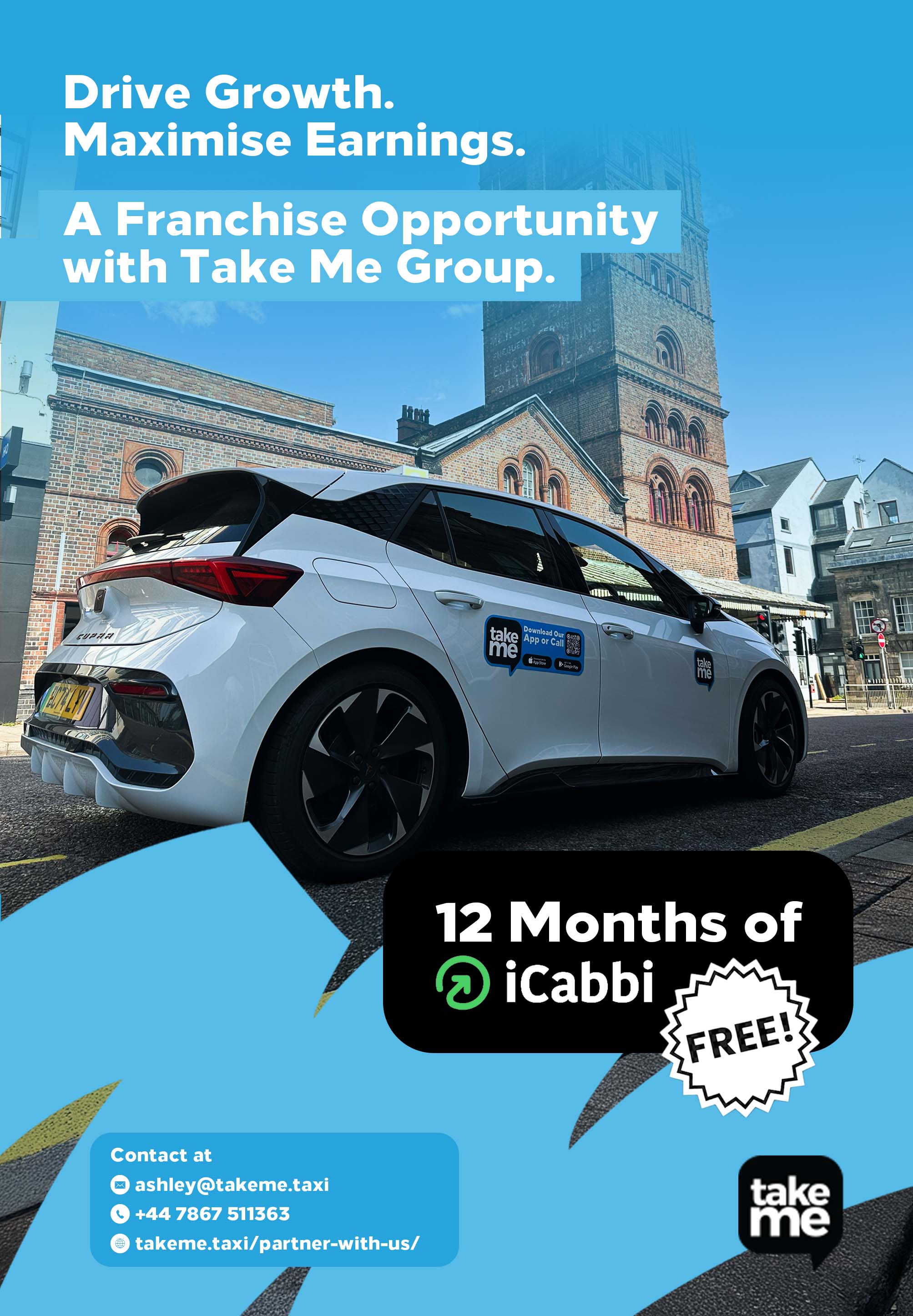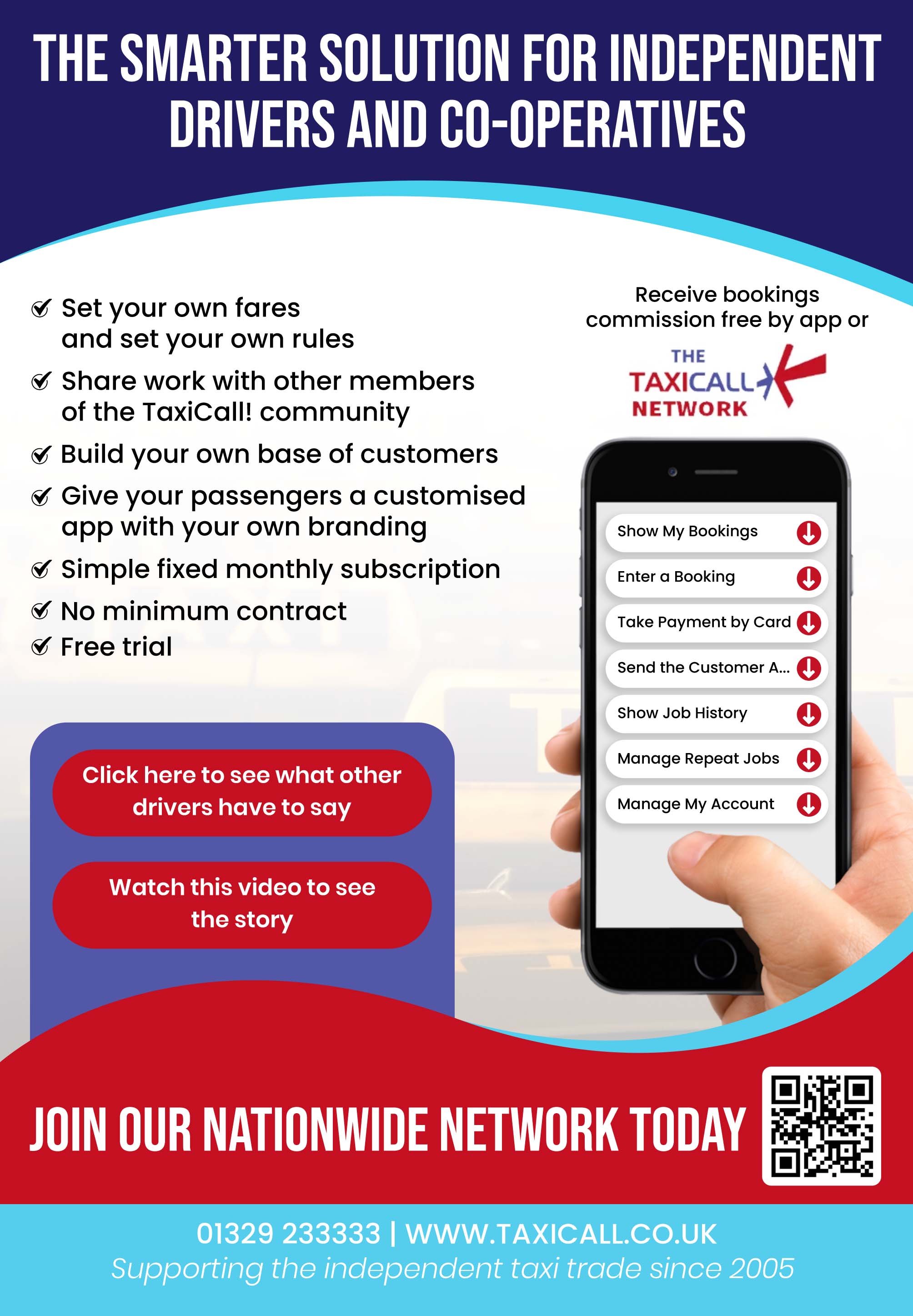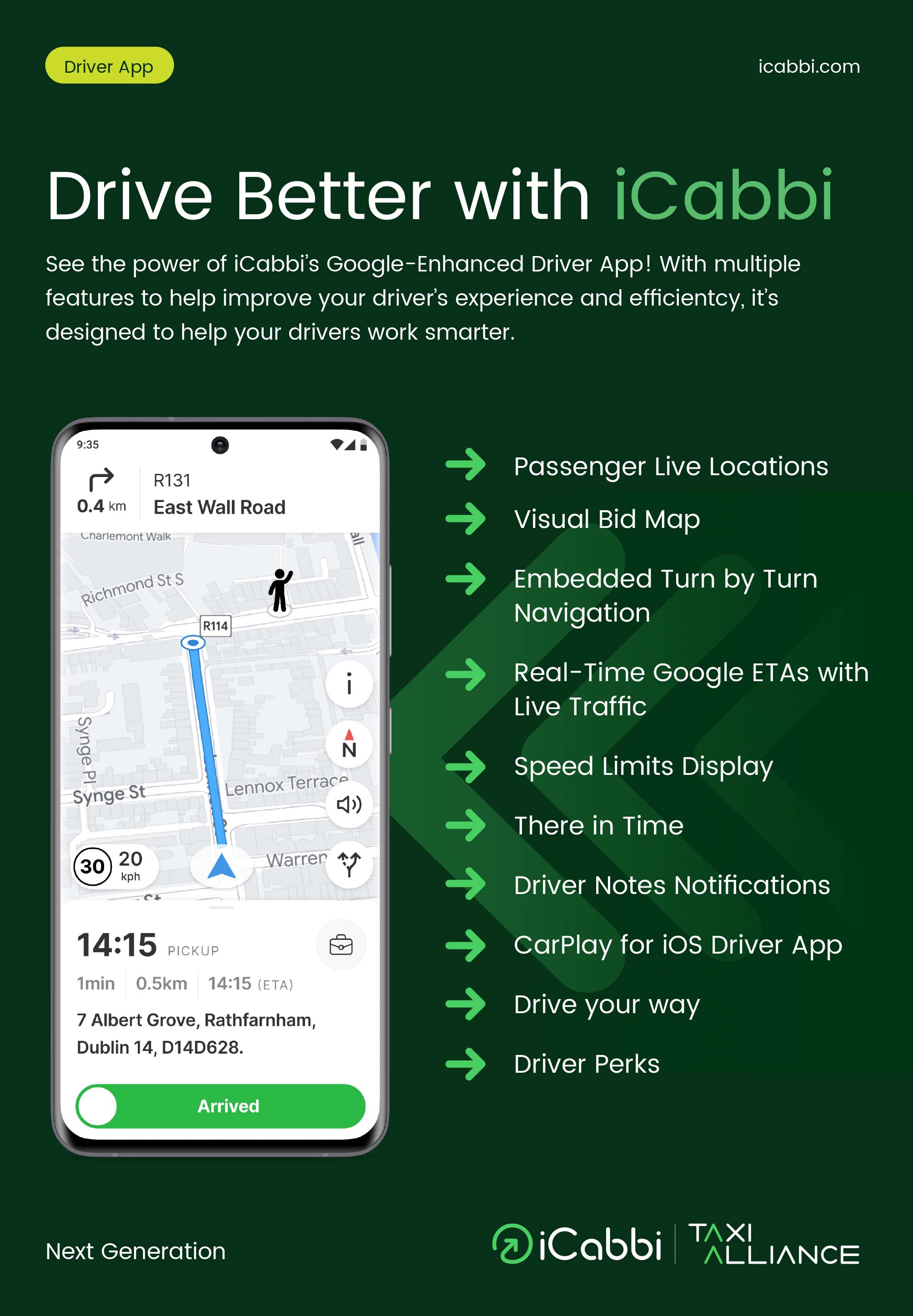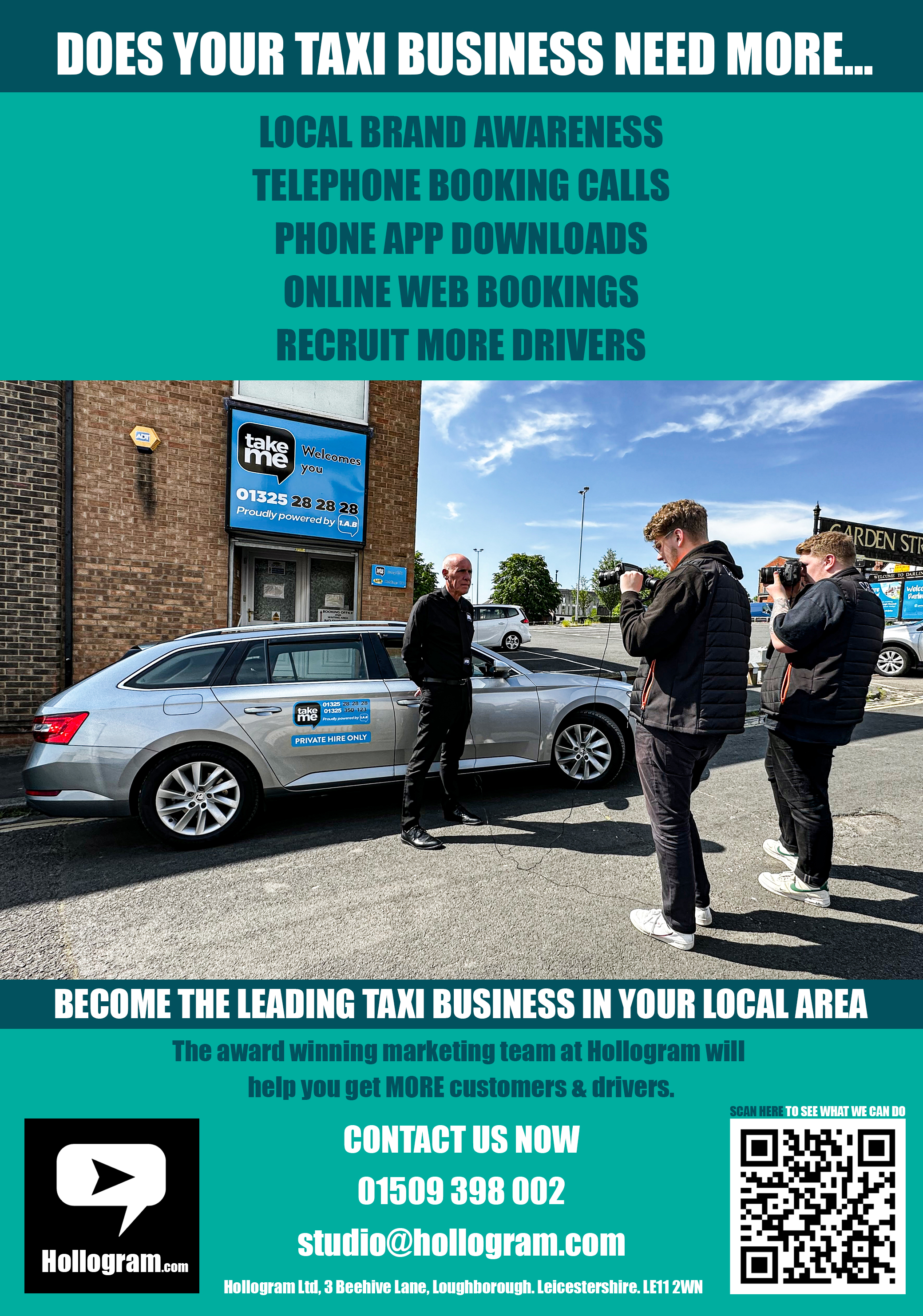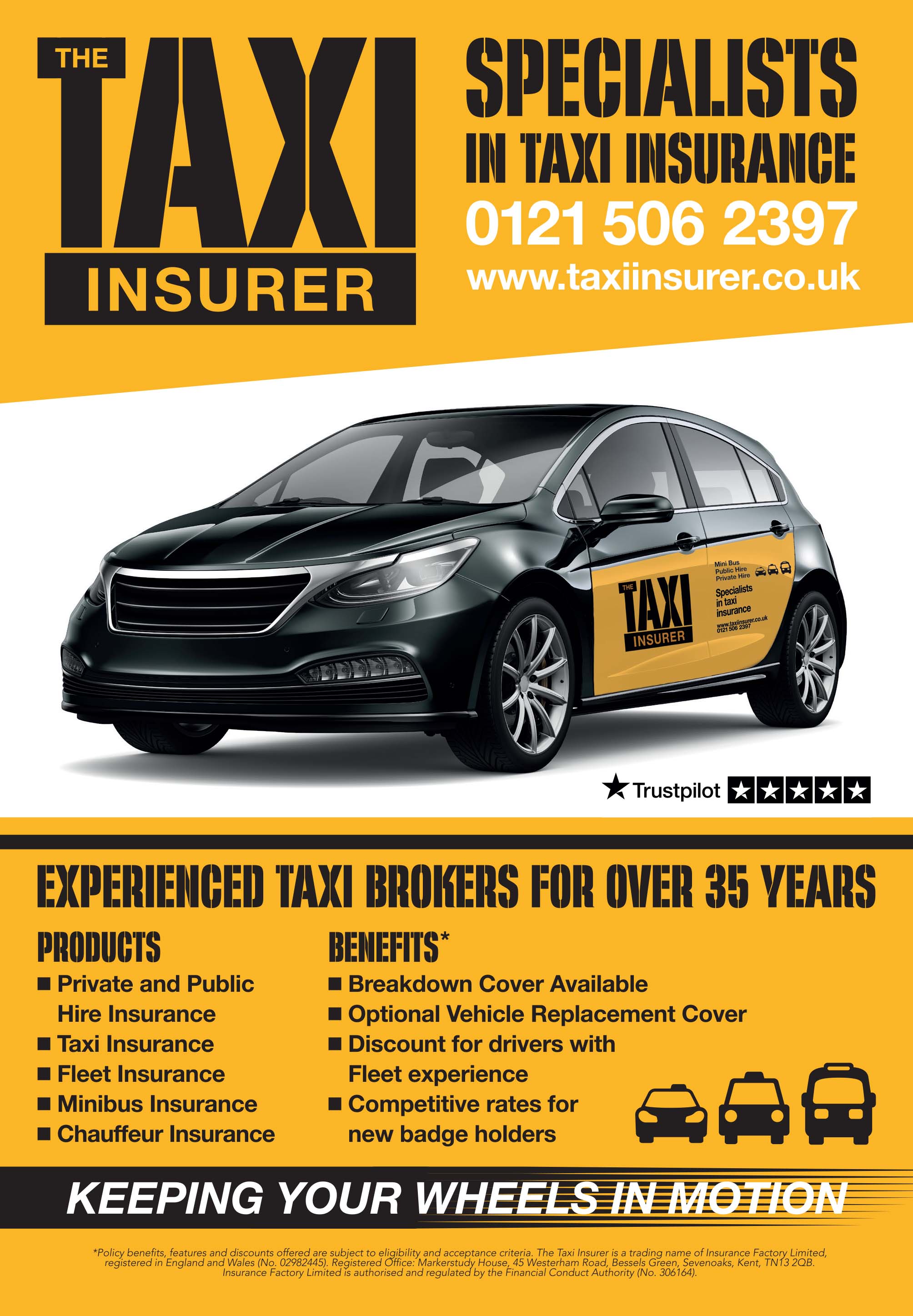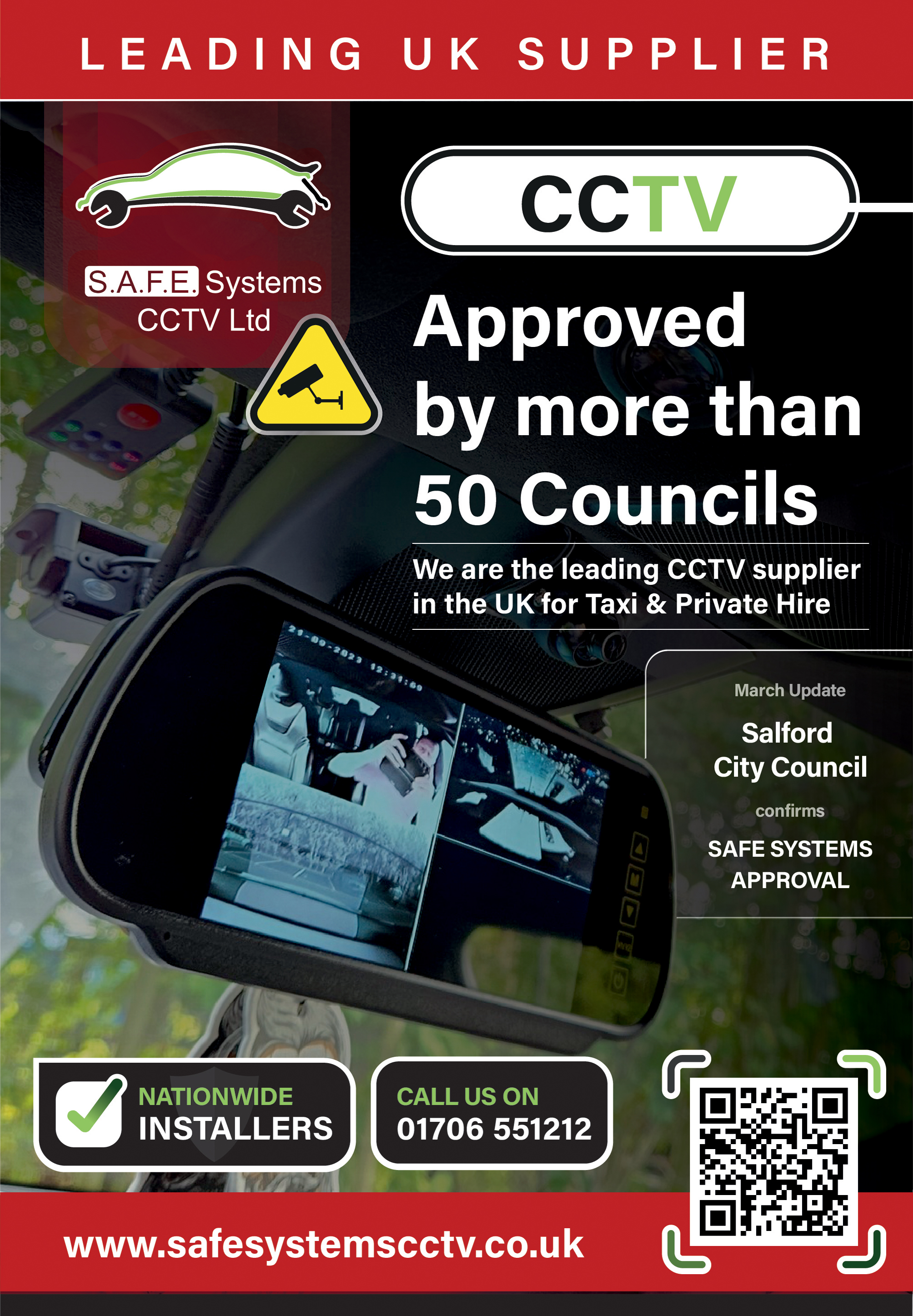
PHONE FRIENDLY VERSION - SCROLL VERTICALLY
EDITORIAL FEATURES
Click each article to go directly to story
- ALL THINGS LICENSING
- ARE WE REALLY SAFE?
- CAB DESPATCH: OUR STORY
- CALLING INDEPENDENT DRIVERS
- CRAZY GREEN AGENDA
- ELECTRIC VEHICLE BATTERIES
- FREENOW BACKS BLACK CABS
- INCOME TAX REPORTING
- INSURANCE INSIGHTS
- KEEPING CUSTOMERS
- KNOW YOUR RIGHTS
- MANAGE YOUR ONLINE REVIEWS
- NPHTA: FIGHTING FOR OUR TRADE
- SPHA CONSULTATION RESPONSE
- TAKE ME FACT FINDING
- TAXIBOT ANNOUNCEMENT
- VAT AND PRIVATE HIRE
- VEEZU: LICENSING REVIEW
NEWS FEATURES
Click each article to go directly to story
All advertisers must comply with the British Code of Advertising practice. The views expressed in this publication are not necessarily those of the publishers. All rights reserved.
ELECTRIC VEHICLE BATTERIES
BUY AN ELECTRIC VEHICLE NOW OR WAIT UNTIL SOLID-STATE BATTERY TECHNOLOGY IS AVAILABLE
by Shaun Marnell
Car n Cab Care
carandcab.co.uk
What is a solid-state battery, what are the benefits for electric vehicles and when will they be available?
A battery is an energy storage device with positively and negatively charged terminals that connect internally through a conductive medium called an electrolyte. Solid-state batteries use a solid or semi-solid electrolyte, such as an alloy, polymer, paste, or gel, in contrast to the liquid polymer electrolyte found in most conventional batteries.
Solid-state batteries theoretically are lighter and offer much higher energy density within the same capacity than the typical lithium-ion or lithium polymer batteries. They therefore offer more range, with a greater resistance to changes in temperature and are safer as the liquid element has been removed.
Being able to pack more energy into the same space means cars with big batteries can go even further on a charge – but it also means that cars with smaller batteries can go as far as those with big batteries do today. Charging is quicker too, so you could shrink batteries even further on the basis that stopping to charge won’t take as long.
In turn, being able to reduce the size of a battery pack while getting the same range has a knock-on effect; lighter cars should ride, handle, go, stop and steer better than a heavier one, but also require less energy to move, making it more efficient. Likewise, a smaller battery means more space for passengers and luggage.
Toyota started testing solid-state batteries as far back as 2014, while other Chinese and Korean manufacturers started in 2017. There have been recent announcements that initial prototypes of solid-state batteries will enter the market by 2026, with broader availability and mass production expected by 2028 -2030.
What about the cars to move these batteries?
Until a time when all manufacturers use the same technology, solid-state batteries will initially be double or triple the price of current electric vehicle batteries making the purchase price of these vehicles very expensive
Experts suggest that the electric vehicle market will eventually just be called the car market as by 2035 all vehicle manufacturers will only be making all-electric cars.
What about current battery technology now?
In the past year we have seen a 20% improvement in range and charging time, improving from 150 to 500 kwh. Some claim up to 400kw with ridiculously quick charging speeds of 15 minutes, with ranges of over 350 miles when charged using our regen fast chargers.
Will solid-state batteries charge as fast as these upgraded lithium-iron phosphate batteries
Some manufacturers, such as MG, have already moved to a semi solid-state battery. The MG4 77kw will be released in 2026 with a semi-solid battery and a range of 329 miles to 430 miles but we expect the charging speed to be lower.
What would I advise private hire and taxi drivers to do?
Car n Cab Care moved away from derv sales and rebranded as an electric vehicle supplier in 2019 as we could see the way the market was changing. However UK licensed drivers and operators have been reluctant to change until now...
In the last 12 months we have seen a massive improvement in vehicle technology with increased ice engines and full electric vehicle sales:
- • 2020 - 2 EV sales to 10 hybrid vehicle sales
- • 2021- 2.5 EV sales to 10 hybrid vehicle sales
- • 2022 - 3 EV sales to 10 hybrid vehicle sales
- • 2023 - 2 EV sales to 10 hybrid vehicle sales
- • 2024 - 3.5 EV sales to 10 hybrid vehicle sales
- • 2025 - 7 EV sales to 2 hybrid vehicle sales, 1 plug in hybrid
Would I buy an EV now or wait for solid-state battery?
Costs to buy now – this is the last year of massive discounts on full-electric vehicles BUT fuelled ice and even plug-in hybrids will continue to rise in price next year until manufacturers actually stop making ice engines.
So the answer is YES and NO depending on a number of factors:
- • If the range of the vehicle is enough and you have affordable charging - YES buy now
- • If the range of the vehicle is not enough but can easily charge - YES buy now
- • If you are driving a minibus or WAV - YES buy now
- • School contract work - YES buy now
- • Long-distance work in a minibus - NO you are better off with an ice or plug-in hybrid for now
Current charging speeds at home
• 58kw = 250 miles = 7.5 hours
• 77kw = 303 miles = 9 hours
• 84kw = 354 miles = 11 hours
• 100kw = 450 miles = 14 hours
Rapid chargers
• 10%-80% = 300 miles = 20 minutes
Conclusion
There are currently massive discounts of up to £16,000 on new electric vehicles but within 12 months these discounts will be reduced back to £6000.
Furthermore in 2025 the price of used electric vehicles have started to increase. The range and charge times of all electric vehicles has already improved by 20%.
So the questions you need to ask yourself is do you really want to wait and spend an extra £10k for what is in essence the same electric vehicle? If you do not need 450 miles a day you are going on rapid charge anyway so better to get a big discount off the list price and accept 350 mile range.
The fact is full solid-state batteries may still be a good few years away from the mainstream and will initially be very expensive to buy.
So if you’re waiting for better technology to arrive before you make that electric vehicle purchase don’t hold your breath
I’m buying now and my advice is so should you..
ROBOTAXIS
WAYMO NOW HIRING AHEAD OF LAUNCH OF ROBOTAXIS ON BRITAIN’S ROADS NEXT YEAR

Waymo has launched a hiring spree in London for operational staff to manage a fleet of driverless cars and respond to incidents on the road, in preparation for the start of its first London trials in 2026.
Autonomous taxi rides without a human driver behind the wheel are expected to begin in Britain next year and London would represent one of Waymo’s first markets outside America.
The Government has said it will allow limited trials of the technology, in which passengers can book robotaxis from an app, from spring. London is expected to be a crucial market for driverless car companies.
Uber has said it will start testing fully autonomous cars on London’s roads using technology from British start-up Wayve which has just started driverless trials with Nissan in Tokyo.
Tesla - which this year launched a Robotaxi service in Texas - is also pushing for driverless technology to be allowed in the UK, having recently demonstrated its self-driving system navigating London’s streets.
Last month, Waymo posted London-based job adverts for a “fleet readiness lead” who is responsible for maintaining driverless cars and an “incident response manager” who handles how the company reacts to road accidents or breakdowns.
The company already has software and AI staff in the UK, having bought the Oxford-based AI start-up Latent Logic in 2019, but the adverts are the first indication it is preparing to launch rides.
A spokesman said the company was continuing to hire and invest in Britain and that it had always said it planned to expand globally.
TESLA ROBOTAXI AMBITIONS FACE LEGAL AND TECHNICAL ROADBLOCKS
Tesla’s push into autonomous mobility is facing significant setbacks, with its Robotaxi and Optimus robot projects raising concerns about the company’s competitive standing against rivals such as Waymo and Cruise.
The company’s ambitious vision for a fully self-driving future is now confronting growing legal, technical, and reputational risks.
Tesla is mired in regulatory and legal challenges; shareholders have filed a class-action lawsuit against Tesla and CEO Elon Musk, alleging they: “overstated the safety and capabilities” of the company’s autonomous driving systems.
This comes after a Florida wrongful-death case tied to Autopilot resulted in a $240 million verdict against Tesla, which contributed to a 6.1% stock drop.
In contrast to Tesla’s struggles, competitors are gaining ground with a more cautious, safety-focused approach. Waymo, which has logged 20 million real-world autonomous miles and over a billion in simulation, has secured key approvals and expanded its services in Phoenix and San Francisco. The company has also partnered with Uber to offer rides in Austin and Atlanta.
Cruise, backed by General Motors, has accumulated 10 million driverless miles in San Francisco and is transitioning to a custom-built Origin vehicle designed specifically for ride-hailing.
Tesla’s technical roadmap also faces headwinds. The Optimus robot project, which aimed to produce 5,000 units this year, is now delayed into early 2026 with only hundreds built so far. Furthermore, Tesla’s reliance on a camera-only system has drawn scepticism from analysts, who contrast it with the more robust multi-sensor approach (using light detection and ranging, radar and cameras) used by Waymo & Cruise.
While Tesla's fleet of millions of FSD-equipped vehicles provides a vast data advantage, the company has yet to prove it can translate this data into a reliable, fully autonomous system.
AMAZON’S ZOOX LAUNCHES FREE DRIVERLESS TAXI SERVICE IN LAS VEGAS
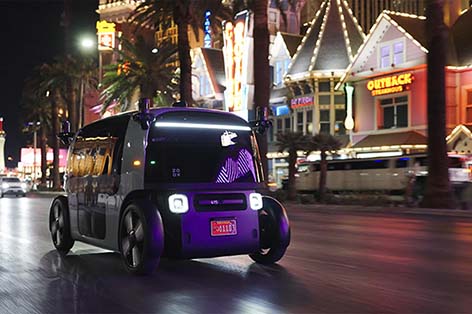
Amazon’s AV subsidiary, Zoox, has officially launched its commercial robotaxi service in Las Vegas, offering free rides to passengers. The launch comes after more than a decade of research, development, and testing.
The service, which can be accessed through the company’s mobile app, will operate on and around the Las Vegas Strip, with stops at popular destinations such as Resorts World Las Vegas, the Area15 entertainment district, and Topgolf.
Zoox is hoping to familiarise the public with its unique, purpose-built vehicles, which feature carriage-style seating for four, bi-directional driving capabilities, and no driver’s seat. Unlike rivals such as Waymo and Tesla, which use more traditional-looking cars, the Zoox taxis have hands-free automatic sliding doors, personalised climate control, and sensors that ensure all passengers are buckled up before the vehicle moves.
The company has been trialling its electric vehicles for several years and has an assembly plant in California capable of producing 10,000 vans annually. The taxis can travel up to 45 mph, operate in the rain, and drive at night.
Zoox plans to begin charging for rides in Las Vegas soon and intends to expand to other cities, with San Francisco, Austin, and Miami next on its list.
With that, Zoox will go up against Waymo, which currently covers the most ground with robotaxis in the US, with services in Los Angeles, Phoenix, San Francisco, Atlanta, and Austin (the last two operate in partnership with Uber).
It'll also compete with Tesla, which began a limited trial in Austin in June, and Lyft, which plans to begin offering rides in Dallas next year.
UBER PARTNERS WITH CHINESE FIRM MOMENTA FOR EUROPEAN ROBOTAXI TRIALS

Uber and Chinese autonomous driving company Momenta are set to begin testing Level 4 robotaxis in Munich, Germany, in 2026. The partnership marks another step in Uber’s strategy to expand its self-driving vehicle services globally, integrating Momenta’s AI technology into its platform.
The collaboration aims to bring Level 4 autonomous driving technology to more European cities following the Munich trials. “Testing L4 AVs in Munich allows us to showcase how Momenta’s AI-driven Robotaxi technology can transform urban mobility,” said Momenta CEO Cao Xudong.
The move comes as Uber broadens its presence in the competitive autonomous mobility sector. The company has already partnered with a number of Chinese firms, including WeRide, Baidu, and Pony AI, as well as Alphabet’s Waymo and Lucid. The field is intensifying as competitors like Tesla push their own driverless taxi offerings.
Momenta, which has a “two-leg strategy” of developing both advanced driver assistance systems (ADAS) and robotaxi technology, has supplied software for 400,000 vehicles through partnerships with major German brands such as Mercedes-Benz and BMW. The company also operates a robotaxi service in Shanghai and plans to achieve commercial deployment without onboard safety operators by the end of the year.
The Uber-Momenta partnership was first announced in May with the goal of expanding robotaxi services beyond the U.S. and China. While the initial German trials will include onboard safety operators, they represent the first major step in this international expansion.
NPHTA: FIGHTING FOR OUR TRADE
DAVID LAWRIE CALLED TO GIVE EVIDENCE
by Dave Lawrie
Director NPHTA
info@nphta.co.uk
I am honoured to be invited, as Director of NPHTA, to attend Parliament on Wednesday 15 October, to give oral evidence as a national representative of our industry, at their first public session of the Licensing of Taxis and Private Hire Vehicles inquiry.
As we all know, the government, prompted by recommendations detailed in the Casey report, launched this inquiry in July 2025, with a submissions deadline of 8 September. The NPHTA promptly set up a working group, made up of our board members and other trade representatives, to discuss and formulate our response and ensure it reflected views from across the country. We also contacted a number of MPs and several licensing authorities for their input, with the intention of creating a combined and informed submission.
There have been numerous responses from various industry stakeholders lodged: https://shorturl.at/VyZE6
However, as I am one of only four people giving evidence at this first session, this invite can only mean that the committee has read and digested our NPHTA submission and consider it to be worthy of further clarification.
Our main recommendations are summarised below:
- • Intended use policies (IUP) work well for hackney carriage vehicles. We believe IUP should now be applied to all licence types: operator, driver, vehicle; and the adoption of this should be a statutory requirement for all councils This does not mean that vehicles and drivers can never provide a service outside of their licensed area, it merely dictates that in order to justify applying for a licence issued by a local authority ‘most’ of the work performed must be fulfilled locally for residents of that region
- • We do not believe the ABBA rule will work - this is where ‘A’ is the licensing district and all journeys must start or end within district A
- • Mandate that the triple lock rule must be more actively enforced: this means the driver’s licence, vehicle plate, and operator’s licence must all be issued by the same licensing authority
- • Mandate enforcement of Section 75(1)(a) LGMPA 1976
2026 THE YEAR OF CHANGE!
NPHTA has been fighting for ALL our trade for over 30 years, and promises to continue to fight to ensure our industry gets the recognition and support it deserves as well as the legislative change it so urgently needs.
SHOW YOUR SUPPORT:
JOIN THE NPHTA TODAY
www.nphta.co.uk 0161 280 2800
CROSS-BORDER CRISIS
UNITED FRONT IN PUSH FOR LICENSING REFORM TO DEAL WITH OUT-OF-AREA WORKING
Local leaders across England are demanding a national overhaul of the taxi licensing system which allows drivers to operate far from where they are licensed, undermining public safety and local economies.
The push for reform, spearheaded by Greater Manchester Mayor Andy Burnham, has gained traction with multiple councils and MPs, who are urging the government to act swiftly.
Out-of-area working is a long-standing issue, with 49% of PHVs in GM reportedly licensed by different councils, such as Wolverhampton.
Mayor Burnham has made this a key pillar of his “Backing Our Taxis” campaign and met with key government ministers on 4 September, including the transport secretary Heidi Alexander, to advocate for the change as an amendment to the English Devolution Bill, moves through Parliament.
He describes the current system as a “matter of public safety” and fairness for local drivers and has the support of local MPs from multiple parties, highlighting a broad consensus on the need for change.
Mayor Burnham said: “For too long, communities in GM and across the country have been at the mercy of a broken taxi system that allows private hire vehicles and drivers to be licensed hundreds of miles away from where they live and operate.
“GM has led the call for reform, and it’s great to see that being backed by our local MPs. With the government having already accepted Baroness Casey’s recommendation regarding out of area licensing - further reinforcing the urgent need for change - this Bill provides an opportunity for decisive action to be taken by the Government.”
The proposed ban has been a long-standing goal for Burnham, who previously stated he had a “firm commitment” from former Transport Secretary Louise Haigh to address the issue.
In Blackpool, MP Chris Webb has also called on the government to pass new legislation to mandate that all taxis operating in the town be licensed locally. Speaking in Parliament on September 11, Webb highlighted the negative impact on the local economy and the livelihoods of taxi drivers.
He stated that out-of-town vehicles are “endangering passengers and costing the town millions,” with one publicly owned bus company alone losing nearly £1.5 million.
In response Minister Alexander confirmed that the government is considering new legislation to address these inconsistencies in driver licensing. This potential reform could include stricter rules for out-of-area vehicles, stronger national standards, and improved enforcement.
In Tamworth, councillors have also called for a uniform national licensing system or a ban on out-of-area taxis. During a council meeting, Cllr Richard Kingstone cited photographic evidence sent by local drivers showing out-of-area drivers reportedly wearing court-ordered tags and sleeping in vehicles at taxi ranks.
Kingstone singled out City of Wolverhampton Council, which he claimed “issues between 12 to 18 per cent of all licences issued in England,” and criticised its “confetti-like issuing of licenses.”
The council voted to write to Secretary of State for Transport and the chair of the transport select committee, to express its concerns and demand regulatory reform in a move it said would protect passengers.
Meanwhile, Bury Council has submitted evidence to the Transport Committee inquiry, advocating for an end to this “broken system.” The council, working with TfGM and the nine other GM licensing authorities, stated that out-of-area licensing “undermines local enforcement and public confidence.”
Cllr Charlotte Morris of Bury’s cabinet said that the council “welcome[s] the inquiry and hope[s] it leads to meaningful reform.” She added that closing this loophole is “about protecting the travelling public and sup-porting responsible, local drivers.”
The council’s position aligns with the ‘Backing Our Taxis: Local. Licensed. Trusted.’ campaign, which seeks new powers for mayoral authorities to regulate and license taxis and PHVs, ensuring all vehicles operating in GM meet uniform safety and quality standards, regardless of where they are licensed.
With a government inquiry into taxi and private hire vehicle licensing now underway, local authorities and MPs hope the growing pressure will lead to decisive action.
CITY OF WOLVERHAMPTON COUNCIL CARRIES THE WEIGHT OF A “NATIONAL FREE FOR ALL”
A local councillor is calling for major changes to national taxi regulations, stating that Wolver-hampton council’s efficient licensing system is carrying the weight of failings across the rest of the country. Cllr Simon Bennett, leader of Wolverhampton’s Conservative opposition, claims the city is paying the price for a “national free for all” when it came to issuing taxi licences.
In July the parliamentary transport committee (PTC) announced an investigation into how standards for taxis/PHVs could be improved, amid concern about inadequate regulation that varies from one area of the country to another.
Cllr Bennett notes that 96% of licences issued in Wolverhampton are for drivers who live outside the area as a result of the city’s stream-lined, fully digital licensing process. “That innovation showed how modern, transparent regulation could work - but the national framework it operates within is now unsustainable,” said Cllr Bennett.
“Wolverhampton’s success in streamlining licensing has inadvertently exposed weaknesses in cross-border enforcement, allowing vehicles licensed in one area to operate almost anywhere with minimal oversight.” He added that the council”s ability to enforce conditions on licences elsewhere in the country is near impossible.
Cllr Bennett also referenced Baroness Casey’s review into CSE, which highlighted “serious safe-guarding failures,” including inconsistent data collection on suspects and patchy oversight of drivers in some areas.
“Baroness Casey called for tougher, consistent standards for taxi licensing to protect vulnerable passengers, recommendations that mirror concerns long raised by Wolverhampton Conservatives,” he said. “Where the council has innovated, it has shown what can be achieved, but no single authority can carry the weight of a licensing system that has become a national free-for-all.”
He urged the PTC to “deliver clear safety standards, proper enforcement powers and a framework that protects passengers and responsible drivers alike.”
ARE WE REALLY SAFE?
by Azeem Hanif Chairman
Independent Transport
Workers Alliance (ITWA)
Public safety
Sadly, the reputation of our trade has been scarred by the vile actions of a pro-rata small number of rogue drivers involved in drugs, sexual assaults and grooming scandals. Perceptions of safety are often shaped by the media and second-hand accounts which can outweigh personal experience. It is therefore essential that our industry is seen to be taking measures to address the concerns of the travelling public so that lone woman, children, vulnerable, disabled and elderly members of our communities are reassured and feel happy and safe to use our services.
Following the DfT’s recent recommendations, the licensing process has correctly become more thorough, resulting in stricter local licensing conditions, man-datory safeguarding courses and stringent driver background checks including detailed DVLA, enhanced DBS and extended immigration reports, before a taxi or private hire driver licence is granted.
Driver safety
However taxi/ private hire drivers have our own safety concerns. We frequently encounter strangers, picking them up from the street, taxi ranks, pubs, clubs and even remote locations. Operating largely in the night-time economy exposes us to intoxicated individuals, as well those under the influence of illegal substances, and despite the trend towards cashless transactions, most drivers still carry an amount of cash, all of which increase our risk of violent attack, robbery, abuse and even hate crimes.
The government provides guidance on how licensed drivers can stay safe (https://shorturl.at/lyl65) but doesn’t address all our concerns, with the safety of the travelling public always taking priority.
Major safety concerns with ride sharing
One major safety issue for both passengers and drivers that needs to be addressed or even eliminated is the recent return of ride-sharing services. Uber Pool was originally launched in 2015, but the option was only available in the UK to passengers in London, and was cancelled during the pandemic in 2020 to reduce the spread of covid.
Uber has now reactivated the programme, but rebranded it with a new name, UberX Share, which has been available in all major UK cities, except London, since the end of June 2025 (with expected rollout in the capital by the end of the year). The service, piloted in Bristol since November 2024, allows a maximum of two passengers, who are travelling in the same direction to share rides at a discount of up to 20%.
Whilst the financial appeal of sharing a ride with a stranger may seem attractive, it raises critical issues for both passengers and drivers. Unlike other modes of transport, such as planes or trains, where space and staff presence provide a sense of security, ride-sharing in a confined vehicle with two strangers sharing the back seat, can potentially escalate into an unnecessary risky scenario.
The dynamics of ride-sharing present unique challenges, especially for lone females, young individuals or vulnerable passengers, who may find themselves in a compromising position. Intoxication further complicates matters, increasing the likelihood of conflicts that not only endanger passengers; but also put drivers who do not have adequate training in deescalation techniques or experience in handling volatile situations, at great risk.
Industry stakeholders therefore have a responsibility to advocate for the DfT and licensing authorities to address these concerns and take measures to prioritise passenger and driver safety by setting minimum standards to regulate ride-sharing practices and so create a safer and more secure environment for all concerned. Ride-share operators must also be held accountable to prioritise safety over profits.
Conclusion
There is a pressing need for consistency across all licensing authorities in the UK; by establishing uniform standards and protocols, we can enhance safety measures and instil confidence in everyone involved. If achieving consistency proves challenging, it is crucial for at least one licensing authority to take proactive steps to set a high standard that others will be compelled to follow.
By taking action to tackle these concerns we can restore trust once again in our industry.
KEEPING CUSTOMERS
NAVIGATING CUSTOMER LOYALTY AND GROWTH IN A COMPETITIVE MARKET - WITH A SMILE
by Rev’d Paul Newbery
The Elite Family
elite-liverpool.co.uk
Introduction
The private hire industry, encompassing taxis, minicabs and chauffeur services, is a cornerstone of urban and suburban mobility across the United Kingdom and Ireland. With the rise of app-based services and shifting customer expectations, operators face the dual challenge of retaining loyal patrons while also attracting a steady stream of new customers.
Success in this competitive market hinges on understanding what customers value, delivering consistent and reliable service, and embracing new technologies and marketing strategies. And remember: if you can make your customers laugh, you’re halfway to getting a five-star review!
This article explores the best practices for keeping existing customers satisfied and drawing in new business in the private hire sector - with a few chuckles along the way.
Understanding customer needs and preferences
Today’s passengers expect more than just a ride - they seek safety, comfort, convenience and value for money. Private hire firms must invest time in understanding their customer base. Regular feedback through surveys, online reviews and direct conversation can reveal areas for improvement and highlight what clients appreciate most about the service.
Tailoring offerings to meet these preferences, whether by providing child seats, accommodating special requests or offering loyalty discounts, builds trust and rapport. And let’s be honest, who doesn’t appreciate a driver who knows exactly when you need peace and quiet - and exactly when you need a friendly chat about the weather or the latest football result?
Delivering outstanding customer service
Excellent customer service remains the bedrock of customer retention. Courteous drivers, prompt arrivals, clean vehicles and transparent pricing are fundamental. Training drivers in customer care, local knowledge and crisis management can make all the difference in ensuring a positive experience.
Moreover, addressing complaints swiftly and professionally demonstrates a commitment to customer satisfaction, often turning a negative incident into an opportunity to strengthen loyalty. Remember, the only thing that should be in the back seat is the customer - not a bad attitude!
Embracing technology for a seamless experience
Technological adoption is transforming the private hire landscape. Customers increasingly expect the convenience of digital booking, tracking and payment options. Investing in a robust mobile app or partnering with established platforms can expand reach and streamline the booking process.
Automated text or app notifications about driver arrival times, vehicle details and trip progress reassure customers and reduce waiting time anxieties. If only you could use an app to predict when your customer will actually leave the pub - now that’s a feature worth inventing!
Building a strong brand and reputation
Brand reputation is a powerful asset in attracting and retaining customers. Encouraging satisfied clients to leave positive reviews on Google, Trustpilot or local platforms can bolster credibility. Responding graciously to all feedback, even criticism, shows professionalism.
A recognisable logo, consistent branding, and community involvement - such as sponsoring local events - further cement the company’s positive image in the public eye. Just remember: your reputation should be spotless, like your car after a good valet - not like the back seat after a Saturday night out!
Loyalty programmes and customer incentives
Rewarding repeat business through loyalty programmes, referral discounts or exclusive offers can motivate customers to choose your service over competitors. For business clients, offering account services with detailed billing and priority booking may be particularly attractive. Seasonal promotions, such as discounted airport transfers during holiday periods, can generate additional interest and attract new clientele. Because nothing says “we appreciate your business” like a free ride -unless it’s a free ride with a complimentary umbrella for the British weather.
Marketing strategies to attract new customers
Effective marketing is more than just advertising - it’s about telling your story and reaching potential customers where they are. A mix of traditional and digital marketing works best for private hire firms. Local newspaper ads, flyers and partnerships with hotels or restaurants remain effective. However, maintaining an active online presence through a professional website, social media and search engine optimisation (SEO) is essential for capturing new business, especially among younger customers who search for services online. If you think TikTok is just a clock that went digital, it might be time to update your marketing strategy!
Networking and partnerships
Forming strategic partnerships can open doors to new customer segments. Collaborations with event venues, wedding planners, travel agencies and corporate offices can generate a steady stream of bookings. Participating in local business associations also creates networking opportunities and enhances visibility within the community.
Remember, the more connections you make, the less time your cars spend parked and the more time they spend where they belong - on the road (hopefully not stuck in traffic).
Meeting regulatory standards and ensuring safety
Complying with all licensing and insurance require-ments is non-negotiable in the private hire industry. Promoting a track record of safety and reliability reassures customers. Regular vehicle maintenance, background checks for drivers, and transparent health and safety protocols - especially in the post-pandemic era - are crucial for instilling confidence in both new and returning passengers. After all, customers want to reach their destination safely, not feel like they’ve just been on the dodgems at the funfair!
Adapting to changing market trends
The private hire sector is continually evolving. Staying abreast of industry trends, such as the shift towards electric vehicles, environmental sustainability, and accessible services for passengers with disabilities, positions a business as forward-thinking and responsive. Operators who demonstrate adaptability are more likely to attract customers who value innovation and social responsibility. “Going green” might not just refer to your customers after a bumpy ride - embracing electric and hybrid vehicles could be your next big selling point!
Conclusion
Keeping customers and attracting new ones in the private hire industry requires a multifaceted approach. By prioritising excellent service, leveraging technology, building a reputable brand, rewarding loyalty and employing savvy marketing strategies, private hire businesses can thrive even in a crowded marketplace.
Above all, a genuine commitment to customer satisfaction and continuous improvement will set successful operators apart, securing their place as a trusted choice for journeys now and into the future.
And remember, if all else fails - just keep the car warm, the conversation light, and always, always know a good joke!
The Elite Family
Hard enough on your own, but a problem shared is a problem halved. Joining the Elite Family is a great way to engage with new technology and to build a network of companies striving to grow and succeed in a tough world.
Stronger together, enquire today about your place in the growing family of operators by emailing family@elite-liverpool.co.uk today.
Big or small we can help you grow!
FIT AND PROPER
BOLSOVER PRIVATE HIRE DRIVER LOSES LICENCE AFTER INAPPROPRIATE CONVERSATION
A PH driver in Bolsover, Onyeka Ljeomah, has lost his licence after a formal complaint was made against him for an “inappropriate sexual conversation” with a female passenger. The decision to revoke his licence was upheld by Derby Magistrates Court, which also awarded £1,065 in costs to Bolsover DC.
Ljeomah, who had been a licensed driver for a short period and had completed a Safeguarding Course, faced a licensing committee on January 16, 2025.
During the hearing, panel members reviewed CCTV and audio from inside the vehicle. Despite Ljeomah’s claim that “nothing was meant by the conversation” and he was not trying to “initiate anything with the passenger,” the committee decided to revoke his licence.
Ljeomah appealed the decision, but on July 18, 2025, Derby Magistrate’s Court upheld the council’s original ruling.
TRAFFORD TAXI DRIVER LOSES APPEAL AGAINST LICENCE REVOCATION
Trafford-licensed taxi driver, Waqas Pervez, 35, has had his appeal denied after his licence was revoked for attempting a pickup in Manchester, without a prior booking.
The incident occurred last November in Piccadilly. Pervez was confronted by another driver for his unlawful behaviour and was recorded on video swearing and threatening the other driver.
He was also quoted as saying, “Everybody does it.”
Following the incident, Pervez’s licences were reviewed by Trafford Council’s Licensing Enforcement Team. In February, the council’s Licensing Sub Committee concluded that he was “not a fit and proper person” to hold his HC and PH licences and revoked them.
Pervez appealed the decision to the Manchester and Salford Magistrates’ Court, but the court upheld the revocation and ordered him to pay £150 costs to the council.
Pervez claimed the fare was pre-booked via his brother and an operator in Salford, but Ben Moran, Trafford Council’s Licensing Enforcement Team Lead, testified that even with such a booking, the fare would still be “unlawful, invalidating insurance and putting the passengers at risk.”
AYRSHIRE TAXI DRIVERS LICENCE SUSPENDED FOR SECOND SMOKING OFFENCE
A taxi driver in North Ayrshire has had his licence suspended for a week after he was caught smoking in his vehicle for the second time, despite a prior warning.
The suspension was agreed upon during a North Ayrshire Licensing Committee meeting on September 10. Graham Brown, who has held his licence since 2008 and has no prior public complaints, was first issued a warning letter on May 22 after a similar offence.
On August 1, however, Licensing Standards Officer Drew Robertson observed Mr. Brown smoking a cigarette while driving in Saltcoats and then throwing the butt out the window.
Mr. Robertson stated that Mr. Brown “was seen clearly smoking a cigarette with smoke being blown out of the window.” When later confronted, Mr. Brown admitted he was “in the wrong” and said he was “under stress” due to a recent death in his family.
During the hearing, committee members expressed frustration that Mr. Brown had disregarded their initial warning.
Cllr Christina Larsen stated that it “feels like to the committee... you totally disregarded the warning shot that was fired to you less than three months ago.”
The committee unanimously agreed to suspend Mr. Brown’s licence for 7 days, from October 1.
FIT AND PROPER
LUTON TAXI DRIVER LOSES REVOCATION APPEAL AFTER LOCKING PASSENGER IN CAB
A Luton taxi driver has permanently lost his licence after a court upheld Luton Borough Council’s decision to revoke it.
Mohammad Razak had his hackney licence stripped in October 2024 after he locked a lone female passenger inside his vehicle, refusing to let her out until she paid a higher fare.
Razak had appealed the council’s decision, but a District Judge at St Albans Magistrates’ Court ruled against him last month.
The judge upheld the revocation, stating that “the driver’s actions had left the passenger distressed and trapped” and he also determined that Razak was “not a fit and proper person to hold a licence.”
Razak has not been permitted to drive a taxi since his licence was initially revoked.
BOLTON COUNCIL REVOKES TAXI DRIVER’S LICENCE CITING PUBLIC SAFETY RISKS
A Bolton taxi driver has had his licence immediately revoked by Bolton Council’s Licensing Committee. The decision came during a July hearing after the committee was presented with a history of misconduct, including a recent assault charge involving the driver’s daughter. Although she later withdrew the prosecution, she maintained her statement was true, stating she simply didn’t want her father to go to prison.
The council also recalled a previous 2018 decision not to renew his licence after he admitted to hitting his wife on three occasions. Further allegations from 2017 included punching his mother-in-law and slapping his wife. Police also noted arrests for suspicion of assault in both 2009 and 2011.
Police told the committee they “did not consider him a fit and proper person to hold a licence.”
The committee ultimately concluded there was “reasonable cause” to believe the driver “posed a risk to the travelling public” and revoked his licence.
In a separate case, the committee also denied a new PH driver’s licence application deeming him not to be a “fit and proper person” after councillors saw video evidence of him hitting a pedestrian and heard complaints about dangerous driving, aggressive behaviour, and inappropriate language.
EDINBURGH CABBIE SUSPENDED FOR 2 MONTHS AFTER ALLEGED ABUSE OF GRIEVING PENSIONER
Edinburgh cabbie, Baris Eroglu, has had his licence suspended for two months following two separate incidents, including one where he allegedly verbally abused a grieving pensioner.
Eroglu, who was previously suspended for telling a council employee to “watch [their] f***ing words,” was disciplined again on public safety grounds.
The latest suspension stems from a May 2025 incident where Eroglu reportedly followed a woman in her 70s into a funeral home after his card reader failed.
In a statement to the council, the passenger claimed Eroglu had “no people skills” and subjected her to a “verbal assault.” She wrote: “I pointed out that all his abusive behaviour was not going to make cash appear in my purse.”
The suspension also takes into account a January 2025 incident where Eroglu was accused of driving dangerously and shouting at a cyclist.
Despite being given a written warning, the driver failed to take a council-mandated refresher course, which licensing officer Catherine Scanlin said he had been given “a number of opportunities” to attend.
Ultimately, the committee concluded Eroglu was not a “fit and proper person to hold a licence,” and voted to suspend it.
CRAZY GREEN AGENDA
PROTECT FAIR ACCESS FOR PHVs IN HASTINGS TOWN CENTRE - COULD YOUR TOWN BE NEXT?
Currently PHVs are permitted northbound access only into Hastings town centre. For years, the local trade has campaigned for southbound access from Hastings Station into Havelock Road. This would provide direct, fair and sustainable access for passengers. Instead of progress, the latest ‘green’ proposals suggest removing northbound access too - leaving PHVs completely excluded.
Below is a letter from Stew Smith of 27/7 Transport Solutions, St Leonards on Sea, explaining the myriad inequities, deficiencies and dangers with this so-called ‘green’ project which has prompted him to organise a petition to raise awareness of the situation and aid fair transport access in Hastings.
Please show your support - this could be you!
“ Dear Hastings Town Centre Public Realm & Green Connections Project Team
“Thank you for your reply of 20 September. I appreciate the acknowledgement of our concerns, but I must be clear, many of the substantive issues raised in my original correspondence remain unanswered or have been set aside rather than addressed.
You have confirmed that PHVs are currently classified as general traffic. That classification is at the heart of the problem. It strips licensed operators, who are a regulated, insured and accountable part of the public transport network, of recognition, while gifting special status to hackneys, delivery drivers and cyclists. Delivery riders, many of whom operate with no regulation or licensing duties, are afforded infrastructure and access, yet licensed PHVs who move the elderly, the disabled, patients and school children are excluded. This contradiction has never been justified, and risks undermining the credibility of the scheme from the outset.
Your suggestion of limited evening or overnight access for PHVs does not solve the problem. It creates public confusion, operational inconsistency, and worsens passenger confrontation with drivers who are forced to explain why access is permitted at 8pm but not 8am. It does nothing for elderly or vulnerable passengers travelling during the day, nor does it support carbon-reduction goals; detours of five times the distance remain, regardless of what happens at night.
You also failed to provide clarity on why the scheme presentation and stakeholder meetings never disclosed that northbound access was also to be restricted. This is a fundamental omission. Stakeholder engagement is only meaningful if information is shared transparently. To conceal or omit material elements until challenged is unacceptable.
Equally, your response side-stepped the looming issue of devolution and deregulation. Local authorities cannot plan for a future that will not exist. Once licensing regimes merge, or PHVs convert to hackney carriage status en masse, these restrictions become unenforceable. Operators will simply license elsewhere or switch category, and all the modelling underpinning your design will collapse. This is not speculation; it is a proven outcome in other parts of the UK. Unless the scheme is future-proofed to recognise PHVs properly, you are building in legal, financial and reputational risk.
On safety, your reply makes reference to CCTV and “safe by design” reviews. But this skirts over the central issue: the biggest safety risk in the town centre will not come from licensed, regulated PHVs, but from the growing volume of e-bikes, escooters and modified delivery vehicles. These are already operating at high speeds, often illegally, in pedestrian zones.
To exclude PHVs while giving delivery riders a “safe zone” is not just inconsistent, it is negligent. Licensed PHVs are regulated, insured, DBS-checked and accountable. Delivery riders are not. Yet your current design affords the latter privileged access while penalising the former. That is the exact reverse of what safety-led, evidence-based policy should deliver.
There is also the carbon issue. You have stated that the scheme supports Hastings’ 2030 pledge and ESCC’s 2050 net-zero plan. Yet the design forces PHVs into needless detours, in some cases five times longer than the direct route, which increases emissions. A wheelchair user travelling 0.2 miles from Hastings Station to Wellington Place is instead driven 1.1 miles via Cornwallis Street, Priory Street, and White Rock. That is additional mileage, additional carbon, additional congestion, and additional passenger frustration. The trade cannot reconcile how this squares with your stated environmental objectives. If anything, it directly undermines them.
The lack of any designated PHV drop-off and pick-up areas only deepens this problem. PHVs provide a door-to-door service that buses simply cannot replicate. Many passengers, particularly the elderly, disabled, or those travelling with shopping or luggage, depend on direct access. Yet your design appears to funnel people into the town centre only by bus or bicycle, while making it harder for those who rely on PHVs. This is counterproductive. The town centre depends on footfall and accessible transport to survive, but these proposals risk starving local businesses of vital income by reducing access for large sections of the community.
This also compounds the wider inequity: hackney carriages licensed outside Hastings are permitted access, but over 300 Hastings-licensed PHVs are excluded. That is penalising the local licensed trade while granting access to operators from other districts, a situation that is neither fair nor defensible. Looking ahead, devolution and deregulation will make this imbalance even more acute. Hastings-licensed PHVs will themselves convert to hackney carriage status, and regionally thousands of additional vehicles could also do the same. The inevitable result is that access will be extended not just to a few hundred, but to many thousands of vehicles across the wider region. To maintain restrictions against Hastings PHVs while opening the door to this outcome is not only inequitable today, it is entirely unsustainable in the very near future.
Taken together, the scheme as it currently stands will not achieve the criteria you say it is designed to meet:
- • It will not lower traffic volumes, as displaced journeys will simply be pushed into longer loops elsewhere.
- • It will not reduce emissions, as detours inflate carbon output per passenger journey.
- • It will not increase safety, as the real risks lie with unregulated delivery vehicles and e-scooters, which your plan does nothing to control.
- • It will not create equality of access, as vulnerable passengers remain disadvantaged by PHV restrictions.
- • It will not be future-proof, as devolution and deregulation will dismantle the very enforcement mechanism you are relying on.
In short, if delivered as proposed, the plan will ultimately fail to meet the objectives it sets out to achieve. It risks being legally challenged, operationally undermined, and publicly discredited.
To summarise:
- • Classifying PHVs as “general traffic” is neither accurate nor workable.
- • Partial or time-limited access will only create confusion, risk and inequality.
- • Excluding PHVs while granting Deliveroo and Uber Eats priority is indefensible.
- • The omission of northbound restrictions from stakeholder meetings undermines transparency.
- • Devolution and deregulation make your current approach unsustainable and unenforceable.
- • Ignoring the accident risks posed by e-bikes and e-scooters while tightening restrictions on licensed PHVs undermines public safety.
- • The scheme cannot deliver on its own carbon or net-zero commitments while forcing PHVs into longer detours.
- • Allowing outside hackneys access while excluding local Hastings-licensed PHVs is inequitable and open to challenge.
- • Denying PHV drop-off and pick-up space reduces access to the town, harms footfall, and risks cutting off the very people the town centre depends on.
I must therefore firmly reiterate: PHV access to Havelock Road and Harold Place must be included within the core scheme. Anything short of this is not equitable, not safe, not environmentally aligned and not future-proof.
Finally, on consultation transparency: you state that feedback will be “recorded and reviewed,” but this does not answer my request. Please confirm:
- • How are consultation responses logged?
- • How are they formally responded to?
- • Will my concerns, in full, appear within the official TRO consultation documentation for transparency and accountability?
This confirmation is essential to ensure stakeholder input is not diluted or selectively presented. ”
Please show your support for fellow cabbies and click the link to sign the petition:
TAKE ME FACT FIND IN SAN FRAN
EXPERIENCING WAYMO IN SAN FRANCISCO - WHAT UK TAXI OPERATORS SHOULD LEARN
by David Hunter
CEO at Take Me
takeme.taxi
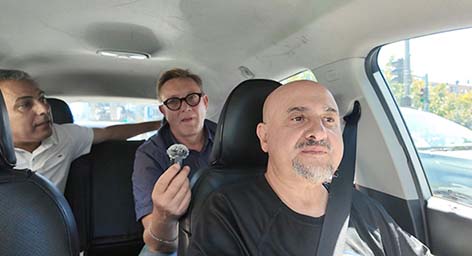
London’s bold 2026 plan for self-driving car trials has had our drivers on edge, asking: “Is this the end of an era for taxis?” To find out how the future really behaves, I visited San Francisco -birthplace of Uber, Lyft, and now Waymo and also home to Google, YouTube and ChatGPT.
When the driverless hype meets the asphalt
Waymo is the only fully operational robotaxi service in San Franciso right now. With about 400-500 vehicles cruising inside a geo-fenced area, it doesn’t serve every corner (The airport? Not yet). Other players, such as Amazon’s Zoox, are dipping toes in via tests, but some have stumbled with safety or regulatory issues.
Flywheel’s surprise counter-attack
On this trip I wasn’t there just to sample Waymo’s driverless pods. I also went with a few colleagues to record an episode of our Taxi Talk podcast, where we sat down with legacy operators, such as Flywheel. I met Izzy, their CEO, and Dave, their General Manager. And here’s the surprise: Flywheel is not only thriving, but it’s also working with Uber - covering UberX jobs via its own dispatch software.
Around half of Flywheel’s work now comes through UberX bookings, though customers are actively choosing the licensed taxi option. Add in strong school and medical contracts, and the picture is one of growth, not decline.
This came as a shock because in the UK, Uber Local pulled away from partnerships with established taxi firms. In contrast, in the US Uber seems happy to coexist across multiple platforms -from Curb to Flywheel to Autocab - offering customers choice while still relying on local operators.
Waymo: novelty, not (yet) disruption
Even among enthusiasts, Waymo rides are more about novelty than savings. Pricing is often the same as Uber or even slightly more, and only a fraction cheaper than a traditional taxi. After a few trips, the novelty fades and you begin to miss the conversation, knowledge, and humour that only a human driver provides.
Safe. Smooth. But occasionally odd
Waymo rides felt safe and smooth, with clean cars and strong support systems. Customer service impressed: press a button if the car is messy, and it’s recalled for cleaning with a credit to your account. But there were quirks - like being dropped off in the middle of a quiet street. In San Francisco’s grid layout it works well, but how would it handle the maze of London backstreets?
Everyone in the mix
Perhaps most surprising: Waymo isn’t trying to wipe out taxis. Instead, taxis, Uber and robotaxis coexist and even collaborate. Waymo itself keeps an account with a local taxi company for overflow work. Apps increasingly present all these options side by side, showing how mobility is becoming a shared ecosystem rather than a fight to the death.
Looking ahead: UK lessons
Driverless cars aren’t about to flip the industry overnight. Expect a 10-15 year gradual integration. The clever operators will adopt autonomous vehicles alongside human drivers, giving customers more choice - and keeping the human touch that passengers still value.
MANAGE ONLINE REVIEWS
INCREASE YOUR TAXI FIRM’S ONLINE RATING
by ReviewMaster
review-master.co.uk
0330 088 6006
Think about the last time you booked something online. Maybe it was a meal, a hotel, or even a taxi. Before clicking “confirm,” did you check the reviews? Most of us do, and your passengers are no different. When it comes to booking a taxi, a company’s online reputation is often the very first thing that influences their decision.
We recently worked with a taxi firm that faced a familiar challenge. Their drivers were excellent, their regular passengers were loyal, and their service was reliable, but their online rating didn’t show any of that. They were stuck at just 2.2 stars, and it wasn’t because their service was poor. It was simply that happy customers weren’t leaving reviews, while the occasional negative experience stood out.
Then they made one simple change: they started using ReviewMaster.
Within only a few months, their rating jumped from 2.2 to 4.3 stars, and the results were immediate.
That is the power of a strong online reputation. It builds trust before the first phone call or app booking even happens. If your rating isn’t where it should be or if you simply want to take control of your brand image, we can help you get there.
At TaxiSolutions, we work with taxi firms across the UK to improve their online reviews, grow customer loyalty, and increase visibility.
Ready to elevate your business and attract more passengers? Start your FREE TRIAL with ReviewMaster today and see the difference for yourself.
CABDESPATCH: OUR STORY
BUILT BY A CAB COMPANY, FOR A CAB COMPANY
by CabDespatch
cabdespatch.com
01843 282828
“Built by a Cab Company, For a Cab Company”...
We’re very proud of this fact but what does it really mean?
Firstly, all the founders, directors and shareholders of CabDespatch have worked extensively in various roles in the cab trade so we really understand the industry.
We understand the needs of running a modern day firm and have a wealth of experience not just with IT but also all of the day-to-day aspects of running a busy cab office;
From drivers complaining about feeding of jobs, to customers complaining of being overcharged or about rude staff, we’ve seen it all!
Sharing office space with one of East Kent’s busiest circuits really ensures that we’re aware of any changes in the industry and enables us to keep up-to-date with all the goings on that affect you and your business.
Be assured, if you need to speak to us, it will always be a friendly human and never an answering robot; and all our staff are able to take ownership of any issue, from top-up training to complex technical issues.
We visit cab companies nationwide and one thing has stood out above all else, all companies are different.
That’s why with CabDespatch we adopt a modular system. Whatever your requirements, we’ll do our upmost to work together to achieve a solution and only add features that you actually need and will actually use.
See for yourself, just give us a call - 01843 282828
SHAME SHAME
NORFOLK WOMAN AVOIDS JAIL AFTER £10K EURO PET TAXI FRAUD
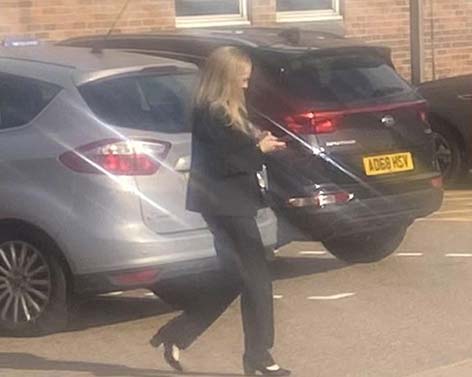
A Norfolk woman who ran a pet transport business across Europe has been given a suspended sentence after defrauding customers out of more than £10,000. Jane Mollett, 49, of Gorleston, admitted to seven counts of fraud at Norwich Crown Court.
The court heard that Mollett, who operated the company Jane’s Euro Pet Taxi Ltd, took money for jobs she never completed, often cancelling at the last minute.
One customer was left stranded at Paris-Charles De Gaulle airport after Mollett failed to show up to transport their pets to the Dordogne in southwest France, forcing the owner to find alternative travel at “considerable expense.”
Prosecutor Hector MacLean-Watt highlighted that the victims suffered both financial loss and additional hardship, stating: “It’s not just the question of fraud but also the loss that was suffered by the various victims.”
Mitigating for Mollett, barrister Danielle O’Donovan said her client was “an absolute mess” and “couldn’t cope” at the time of the offences. She said Mollett was driving up to 10,000 miles a week and suffered a “mental breakdown at the time,” adding that “circumstances forced her hand.”
The court was told Mollett has no previous convictions and has borrowed money from her parents to repay the victims.
Recorder Peter Guest noted that while she had “simply taken on too much,” customers had entrusted their pets “precious no doubt to them” in her care.
Mollett was sentenced to eight months in custody, suspended for two years. She was also ordered to pay back a total of £10,345 to her seven victims within six weeks, complete 150 hours of unpaid work, and pay £150 in court costs.
FORMER LOUGHBOROUGH CABBIE CONVICTED OF 2006 RAPE DUE TO DNA MATCH IN 2022
A former Loughborough taxi driver, Mahbubur Rahman, has been convicted of a 2006 rape after a DNA sample taken during an unrelated arrest nearly two decades later linked him to the crime.
Rahman, now 50, was found guilty of rape on 3 September, at Leicester Crown Court following a trial. He is scheduled to be sentenced at a later date.
The victim, a 19-year-old woman at the time, was intoxicated when she got into Rahman’s taxi in the early hours of October 7, 2006. She reported the sexual assault to police immediately after arriving home.
Although an investigation was launched, the case was filed away in 2009 after all leads were exhausted.
The breakthrough came in April 2022, when Rahman, who had no prior criminal record, was arrested for an unrelated burglary. As part of standard police procedure, a mouth swab was taken and his DNA was entered into the policing database.
This sample provided an “exact DNA match” to the semen samples collected at the time of the rape.
DC Kristina Page-Brown, the officer in the case, noted the significance of the conviction for the victim, who “has waited 19 years to get some sort of resolution and justice for the traumatic ordeal she was subjected to that night.”
Rahman initially denied the offence, later claiming the sexual encounter was consensual.
“The victim trusted Rahman to take her home after a night out in Loughborough,” DC Page-Brown said. “Instead, he abused that trust and took advantage of a vulnerable woman in the worst way imaginable.”
She added that Rahman has “evaded justice for far too long and throughout has shown no remorse or regret for what he did.”
The detective expressed relief that the victim can now see the man who “caused irreversible damage to her life” finally face justice.
UBER DRIVER TO BE JAILED FOR SEXUAL ASSAULT OF TEEN PASSENGER IN GLASGOW
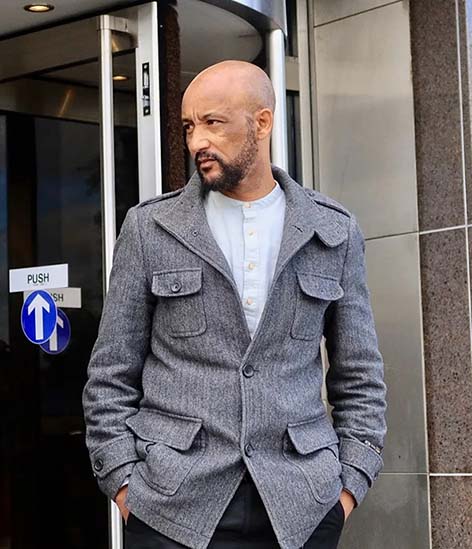
An Uber driver in Glasgow, Dawitt Tessema, has been found guilty of sexually assaulting a “very drunk” 19-year-old girl in the back of his vehicle and has been remanded in custody.
The 45-year-old was convicted after a trial at Glasgow Sheriff Court.
The court heard that in the early hours of September 15, 2023, Tessema picked up the victim and parked his car before getting in the back seat and sexually assaulting her.
A prosecutor told jurors: “He put his hand through the centre console and tried to touch her on the body and leg but could not reach. He then went in the back of the car and touched her under her pants that were still on.”
After the victim reported the incident to Uber, Tessema texted her, saying: “I’m really sorry, please forgive me, please, please.”
When arrested, he told police: “I have to stop, I made a big mistake.”
Sheriff John McCormick told Tessema that a “custodial sentence is inevitable,” adding: “You accepted the trust of a passenger in your vehicle. There, you had a 19-year-old female who had drunk alcohol to excess.
“You took advantage of her in the confines of your taxi which was a gross breach of trust.”
Tessema has also been placed on the sex offenders’ register.
NOTTINGHAMSHIRE COUNCIL BANS CABBIE OVER TERRIFYING INCIDENT WITH VULNERABLE GIRL
A taxi driver has been banned from all Nottinghamshire County Council jobs following a “terrifying” safeguarding incident involving a 13-year-old girl with special needs.
The girl, Lottie Turner, was a passenger in an A1 Cars taxi on Wednesday, September 10, when the driver made an unauthorised stop to pick up a second, “vulnerable” man.
Lottie’s mother, Angela Turner, 44, was tracking the journey via an app and noticed the car was going in the wrong direction.
The teenager, who is neurodiverse and has specific health conditions, requires private transport, and her family had been assured she would be travelling alone.
“Lottie messaged me to say another man was in the taxi and she was scared,” Angela said. A sound recording Lottie made inside the vehicle seems to capture the two men “seemingly fighting.”
Terrified for her daughter’s safety, Angela called the taxi company, the owner was very rude, shouted at her and accused her of lying.
The second man then exited the car, and Lottie was taken home.
“She was shaking when she came in, she was crying and she was upset,” Angela explained, adding that Lottie “doesn’t feel safe anymore now.”
A spokesman for A1 Cars con-firmed the driver, who is licensed by the City of Wolverhampton, was immediately suspended.
He admitted the driver “should have dropped off Lottie first and then pick up the other man,” calling it an “unforgivable” mistake.
The spokesman also claimed the other man was a student picked up to “save time.”
In response to the incident, Derek Higton, executive director for Place at Nottinghamshire County Council, announced that the council has terminated its contract with A1 Cars.
“We have also taken steps to ensure that the driver involved in this incident will no longer work on any Nottinghamshire County Council contracts,” he stated.
A new transport provider has been arranged for the family, and the incident has been reported to the appropriate authorities.
VAT AND PRIVATE HIRE
“REEVES PLOTS TAXI TAX” ARTICLE: CLARIFICATION
Jonathan Main, VAT partner MHA, told PHTM:
“ I read the article in the Daily Telegraph with interest and I thought it would be worth providing clarification of the VAT position. While it is certainly true that the Labour Government may use the Budget in November to raise additional tax revenue, the private hire sector is not necessarily an easy target for the Chancellor.
As things stand, any operator based outside London can rely on existing HMRC guidance to only pay VAT on account work sold as principal, charges to drivers for access to passenger bookings, and fares earned by an operator’s employees.
This position was recently reinforced by the Supreme Court victory for operators outside London.
In addition, Bolt continues to defend its decision to only pay VAT on the profit earned on fares, rather than the full fares paid by passengers. The most recent victory for Bolt was published by the Upper Tribunal in March 2025.
I understand that the case will be heard again in the Court of Appeal in mid 2026. The profit earned by Bolt would reasonably equate to the charges it previously made to drivers for access to passenger bookings.
If HM Treasury decides to target the private hire sector as a source of additional tax revenues, it will need to change primary VAT law to require operators to pay VAT in full, regardless of both the legal relationship with drivers and the ongoing litigation with Bolt.
This is certainly possible but at the very least would require very careful consideration of existing private hire licensing regulations across the UK, a clear definition of the type of journeys provided by operators which would be affected by this change, and the self-employed or worker status of drivers.
Without this, HM Treasury could not be certain how much revenue would be raised, and the potential for future challenges by the sector. There are far easier targets for the Chancellor that will raise more revenue and have less potential to be challenged in future court processes.
In my view, operators should continue to push the Treasury to publish its thoughts on the Government consultation, so that the sector can engage in more meaningful dialogue towards an outcome that suits businesses, passengers, and HMRC. ”
CALLING INDEPENDENT DRIVERS
Paying too much commission to Uber?
Not getting enough work from your local operator?
Want to build your own base of repeat customers?
The balance of power in the taxi industry has shifted greatly in favour of drivers over the last five or so years. You, the driver can choose who you work for and when. You probably have at least one of the popular apps, and you might also do work for one or more local operators. All these relationships generate bookings, but at a price. The middlemen always take a cut, which could be 25% or more of the fare.
TaxiCall is a fresh, fairer, and friendlier alternative. It’s a booking app, and it’s a nationwide community of independent drivers. Members just pay a low subscription (less than £10 a week) to join, and you earn every penny of the fare from each job you do. You are in complete control, you set your fares, and there is no commission. We don’t do surge pricing, we don’t monitor what you do, and we don’t penalise you for refusing jobs.
How does it work?
When you sign up on our website, we set up a personalised passenger booking app just for you. It shows your branding as well as the TaxiCall logo. We send you a QR code which you give out to each new passenger who rides with you.
Passengers use the app to book their next rides directly with you. When you are not free to accept a job, the TaxiCall system will look for another driver in the network who is close to you and offer the job to them. The passenger gets their ride, and you still retain them as your customer.
Passengers can also use the TaxiCall app to book rides whenever they travel outside their home area. The system will always try and find a local driver in the network who can serve them.
Does it work for groups of drivers?
We have many groups of drivers in the TaxiCall community who co-operate under a single brand name. We set up a branded passenger app for each group to give to their customers. We can also provide the group with a special local phone number so that passengers can book by phone if they prefer.
Groups can also allow their regular passengers to nominate their favourite driver. The named driver will always be given the first chance to accept a booking.
Here’s what one of our members says
ABC Taxis in Stevenage is a small group of private hire and hackney drivers. They specialise mainly in contract work and have been in business for over 20 years.
Paul Barratt, the owner, says:
“We have been using TaxiCall since 2008. Our drivers sign in and out using their phones. Customers call our memorable local number which is handled for us by TaxiCall. The system looks for the driver whose turn it is to get the next call in the area and connects the customer directly to them. If the driver isn’t available, TaxiCall intelligently deals with the situation and wherever possible will connect them to another driver who can take the job.
“We have several VIP customers, including the local hospital, who are given priority treatment. Taxicall recognises who they are and will always ensure that their calls are connected to one of our on-call drivers.
“The whole system is simple run at very low cost. We don’t need an office, and we don’t need staff to manage our bookings. We just pay TaxiCall a monthly subscription plus the cost of routing the calls. It works out at less than 25p per job. The people at TaxiCall are friendly and knowledgeable, and they’re always on hand to help us when we need them.
Our drivers like it because it makes their life easy and it feeds them regular work, and our customers like it because they speak direct to the driver who is going to do the job.”
VEEZU: LICENSING REVIEW
by Andrew Wescott
Corporate and Government Affairs Director Veezu
veezu.co.uk
As the Transport Select Committee begins the process for oral evidence sessions on its inquiry into taxi and PHV licensing, there are many in the industry wondering if this is another false start on the road to updated legislation for the sector, with the inquiry ending with another report with recommendations that go nowhere. Alternatively, this inquiry could be the starting gun for genuine change. The fact that the inquiry is happening alongside Andy Burnham’s review of licensing in Greater Manchester suggests there is momentum for change.
There has been a clear politicisation of some of the issues in recent months. In particular, the issue of drivers obtaining licences from one area and then working in another. It is important to note that this is legal - as long as the licensing triple lock is in place - and is regulated. I will go into further detail on cross-border hiring below; however, the issue is poorly understood and has led to some ill-judged advice.
If this is the beginning of genuine change for the industry then the government must consider views from operators, drivers, passengers, regulators and all those that are intrinsic to the taxi and PHV industry. The end point of this process will be largely determined by the government’s appetite for change, where taxi and PHV licensing sits on its priority list and whether there is enough time for legislation to be fully enacted.
The Transport Select Committee inquiry provides us with an insight into where any possible legislation may go. It has been interesting to read the submissions and there are some clear themes emerging.
National Standards
The desire for national standards appears to be universally agreed upon throughout the industry (this is no small feat). Getting the industry to agree on something and show the willingness to make a change should not be underestimated and the government should take the opportunity presented to it. Clearly, the devil is in the detail when it comes to national standards. Should they be minimum standards that leave licensing authorities with room for interpretation? Much of the evidence submitted to the select committee critiqued the inconsistent policies across local authorities. This suggests that the industry wants some firmer and stricter national standards with little room for interpretation.
Enforcement powers across borders
The current restrictions on licensing authorities to enforce standards across borders is an issue that surfaced throughout the written evidence. It is clearly a frustration for enforcement officers and for those licensing drivers who are subject to local enforcement. It seems like common sense to allow cross-border enforcement, but it would require some standardised policies. There would need to be an agreement on resources for enforcement, particularly in areas where there is a high volume of drivers operating who are licensed elsewhere. There are already examples of cooperation and joint enforcement activities which could act as a model for this.
Accessibility improvements
Disability awareness training is another area that is inconsistent across licensing authorities. While only around two-thirds of licensing authorities require disability awareness training, there is significant variation in the quality of the training. In addition, to training inconsistencies is the availability of wheelchair accessible vehicles (WAVs). This is an area where national government and local authorities must work with the wider industry and passenger groups. WAV availability is poor, and these vehicles often cost more than standard vehicles. This has an impact on service provision and needs to be addressed. It is also where enforcement must be consistent, so the failure to fulfil a WAV booking or carry a passenger with an assistance dog is dealt with in the most serious way.
Cross-border hiring
This is the most contentious of all the issues that the Transport Select Committee and any future legislation will have to address. Often safety has been used as the argument against cross-border hiring. There has been little evidence provided to support that. This issue has been overly politicised as part of the debate.
There have been local politicians in one area advising passengers not to use drivers licensed elsewhere due to safety. At busy periods this could leave passengers without a safe vehicle in which to get home, with them walking late at night and possibly increasing their risk of harm.
It is fundamental to understand why drivers choose to license elsewhere. Often it is deemed to be due to one licensing area having lower safety standards. It is more likely to be a combination of the approval period for a licence application and the cost of licensing. These are two inconsistent processes and policies across licensing authorities. The point was recently addressed in parliament by Richard Holden MP, Shadow Secretary of State for Transport. He raised concerns about inconsistencies in the time taken by licensing authorities to accept or reject PHV applications. He also asked what assessment had been made of the consequences when authorities take extended periods to reach decisions. Any inquiry or legislation must address this issue before any proposals on cross-border hiring are considered.
The calls to immediately ban cross-border hiring miss the wider issues with the current licensing framework. There are 263 licensing authorities in England according to government statistics. Many single journeys will cross these boundaries and an outright ban on cross border working would make these journeys impossible. Without changes to licensing boundaries, many passengers would be left without safe, affordable and reliable transport.
There are some recommendations that propose that a driver can only start or finish a booking in the area where they are licensed or that a driver should only be able to take the majority of bookings in the area where they are licensed.
These two options merit further discussion and research; however, there is a risk that they over complicate the situation. Passengers want to get to their destination as quickly and cost effectively as possible. This means that operators need to be able to run their businesses as efficiently as possible. If policies inhibit this efficiency, then there will be service issues alongside environ-mental ones with hundreds if not thousands of wasted miles per year.
While a ban on cross-border hiring may be tempting to politicians, the unforeseen outcomes, if this is done in isolation, could be disastrous for passengers.
What is next?
The government has signalled its intention to review taxi and PHV licensing and it seems they are serious this time. As with any policy change the government must be clear about what it is trying to improve and who wins and losses. The industry and the passengers we carry will not benefit from quick fixes.
They must ensure that any policy changes improve passenger safety and support a thriving industry that help people with essential journeys that enable other businesses and industries to survive.
UBER UPDATE
UBER SEEKS TO EXPAND INTO NORTH LINCS BUT WOULD REQUIRE REMOVAL OF LAND LINE BARRIER
Uber is in discussions with North Lincs Council about launching in the area, a move that could see the local authority update its taxi licensing rules.
Council officers confirmed the talks at a recent place scrutiny panel meeting, where they revealed that Uber is seeking a licence to operate in the region. But a key obstacle is the council’s current requirement for licensed operators to have a land line.
Uber said: “There are specific local restrictions around the need for a land line phone and we’re keen to discuss this with the council, as we believe there’s an opportunity for us to launch here.”
Richard Cropley, the council’s head of trading standards, said that the council would look to update the land line requirement in the future.
He added: “I think that it’s better to have them onside to ensure that they’re licensed with us under our licensing regime.”
UBER BACKS OXFORD CONGESTION CHARGE CITING TRAFFIC RELIEF
Uber has publicly declared “strong support” for the proposed £5 daily congestion charge in Oxford, a move that comes just months after it launched in the city.
PHVs and taxis would be exempt from the fee, which is currently under consideration by Oxfordshire County Council.
In a statement, Uber praised the initiative’s aim of “reducing traffic and improving public transport, cycling, and walking conditions.”
The company: “welcomes the exemption for HCs and PHVs, recognising their role in providing accessible, flexible transport.”
Uber also emphasised the need for a “streamlined registration process” for PHV exemptions.
The sentiment is echoed by local operators who have long struggled with the city’s traffic issues.
Sajad Khan, secretary of the City of Oxford Licensed Taxicab Association, described congestion as a “massive issue” and high-lighted the real-world impact on passengers. “It’s vital that people understand the level of traffic impacts people we take to hospital. A lot of them miss their appointments” Khan said.
ELMBRIDGE BC INVESTIGATES UBER ACTIVITY AT WEYBRIDGE STATION
Elmbridge BC has launched a Stage One investigation following a formal complaint submitted by Unite the Union regarding persistent breaches by TfL-licensed Uber vehicles at Weybridge train station taxi rank.
Local drivers report months of loitering and illegal parking by Uber vehicle. They also say Uber drivers loiter for work inside council car parks,but never pay for parking. Yet the council has repeatedly claimed it “didn’t see anyone.”
A major concern is that around 50% of the taxi rank area is not covered by Uber’s geofence, allowing Uber drivers to loiter just outside the zone - either directly next to the rank or in the Weybridge Heath North and South car parks, without bookings.
The twist? When drivers submit video evidence, the council refuses to act - arguing the footage wasn’t filmed by them.
This position was confirmed last year by the Data Protection department after a legal enquiry from solicitors. As a result, driver-recorded violations are effectively inadmissible, leaving enforcement toothless and Uber unchecked.
Miroslav Podlecki, a leading voice in the Elmbridge taxi trade, told PHTM: “It’s a clever combination - don’t record, don’t acknowledge, and claim nothing’s wrong. We hope this investigation finally breaks that pattern.”
Further updates are expected as Unite the Union and local advocates push for accountability.
UBER UPDATE
CUMBRIAN TAXI BOSS FEARS FOR FUTURE AS COUNCIL GRANTS UBER LICENCE
A local taxi firm owner in Cumbria is voicing serious concerns for the future of his business after Westmorland and Furness Council granted a licence to Uber.
The decision to allow Uber to operate directly in the south Cumbria area, has been met with anger from independent operators.
Allan Hamilton, who owns Able & Station Taxis in Penrith, believes the move could be the end for him, adding that the council’s decision was “disgusting” and made with “no consultation.” He claims the council is “giving our work away to Uber which is basically a middle man.”
The council’s regulatory committee approved the PH operator licence after a meeting on 11 September. The council said while it permits PH operator licences for up to five years, it would grant a three-year licence to Uber “to allow for local oversight”.
It also imposed conditions on the licence, including a complaints protocol and relevant staff training, but for local cabbies like Hamilton, the threat to their livelihood remains.
UBER APPLICATION TO OPERATE IN SOUTHEND SPARKS DEBATE OVER LOCAL DRIVER IMPACT
Southend could soon see Uber operating there after the company submitted a new licensing application, seven years after it was banned in 2018 for safety concerns.
The application was confirmed by council leader Daniel Cowan at a full council meeting on September 11. The news has ignited a debate, with some local figures raising alarms about the potential impact on traditional cabbies.
Simon Shepherd, a former long-serving cabbie, stated that local taxi companies would be “absolutely slaughtered.” He believes Uber will “flood the area with cars” and use “discounts” and “vouchers” to quickly attract customers, a strategy he claims would make it impossible for local cabbies to compete.
He warned that this could put “an awful lot of people out of work.”
However, Martin Terry, councillor for community safety, noted that previous issues with the Met regarding access to driver records have been resolved, and “it’s no longer an issue.” He added that Uber “offers competition and flexibility” and that if the service is now considered safe, “then we should welcome them.”
The council confirmed it will now process the application through the appropriate channels.
HIGH PEAK TAXI ASSOCIATION CALLS FOR CRACKDOWN ON UNLICENSED UBER DRIVERS
High Peak Taxi Trade Association is urging High Peak BC to take “urgent action” against Uber drivers they claim are operating illegally in the borough without a local operator’s licence.
The association argues that the presence of these drivers, licensed outside the area, creates an “unfair and unsafe environment” for both local drivers and passengers.
According to the association, local drivers who adhere to High Peak’s licensing standards are being excluded from the Uber platform within their own community. The association’s spokesperson stated: “We’re not asking for special treatment, we’re asking for fairness.”
They argue that if Uber wants to operate in the High Peak, it should hold a local operator’s licence “like every other firm,” ensuring that “all vehicles are properly vetted” and the company is “accountable to local standards.”
The association claims its repeated complaints to the licensing team have gone unheeded. In response, High Peak BC’s executive councillor for licensing, Fiona Sloman, stated that the issue “has only just been brought to the council’s attention so we will need time to investigate before we’re able to provide a fuller response.”
JUST DESERTS
FORMER POWYS NURSE FINED AFTER FAILING TO PAY £30 TAXI FARE
A former nurse, Victoria Foster, 31, was fined by magistrates after she admitted to a charge of making off without paying or a £30 taxi fare.
The incident occurred in Montgomery on January 8.
Prosecutor Helen Tench told the Welshpool Magistrates’ Court that Foster’s card was declined when she attempted to pay for the journey.
According to Tench, Foster “left” despite being told of the declined payment. The cabbie gave her until 6pm the following day to settle the fare, but the deadline was “ignored.” Foster also reportedly “declined” an offer for an out-of-court settlement.
Her solicitor, Gurleen Kaur, stated that Foster had been experiencing a “turbulent” time and suffering with her mental health.
Magistrates fined Foster £20, ordered her to pay £30 compensation to the taxi company, plus £85 costs and an £8 surcharge.
GANG KIDNAPS TERRIFIED CABBIE IN NEWCASTLE AT GUNPOINT IN TARGETED ATTACK

A gang from Gateshead kidnapped a terrified taxi driver and his passenger at gunpoint after blocking their taxi in the streets of Newcastle.
According to a Newcastle Crown Court hearing, the victim, a Syrian refugee, was driving his Suzuki taxi on August 24 of last year when a red Range Rover blocked his vehicle in Jesmond Vale.
Prosecutor Emma Dowling stated: “The men in the Range Rover were clearly expecting the men to be there. They had travelled from Chopwell to Jesmond to threaten and intimidate them.”
The court heard that one of the assailants, Andrew Wright (centre), was in the driver’s seat with “a realistic firearm” lying “casually” on his lap. The two victims were then taken “against their will” at gunpoint to Gateshead in the taxi.
Once in Gateshead, two of the kidnappers, Wright and Simon Walton (left), took the passenger into a flat. The taxi driver, however, was left in the car with another gang member, Scott Haug.
The court was told that a police car unexpectedly drove past, startling Haug, who then fled. This gave the taxi driver a chance to escape on foot.
Meanwhile, Wright and Walton left the flat with the passenger and returned to Chopwell in the taxi. The car was later found burned out near Winlaton.
The taxi driver, who suffered a head injury, reported the incident to police about an hour later. The court heard that he was a “distressed and fearful witness” and later withdrew his support for the prosecution.
The dash cam in the taxi, which the kidnappers initially believed was recording, only captured footage because they had touched it. It showed “how terrified” the victim was and how “close he was to the gun.”
The motivation for the crime was likely financial gain, as Ms. Dowling said: “It does appear they were trying to obtain something from (the second man), probably money.”
Wright, 33, of Hamsterley Colliery, was sentenced to seven-and-a-half years in prison. He pleaded guilty to kidnap, possession of a firearm or imitation firearm, and driving while disqualified.
Walton, 34, of Chopwell, received a four-and-a-half-year sentence for kidnap.
A third gang member, Joseph Henderson, 28 (right), also of Chopwell, pleaded guilty to participating in an organised crime group for his role in driving the Range Rover. He was sentenced to two years in prison.
The fourth gang member, Scott Haug, who also pleaded guilty to kidnap, will be sentenced at a later date.
During the sentencing, Judge Gavin Doig described the incident as “serious offending. Planned, with weapons, carried out in daylight in the streets of Jesmond and Gateshead.”
DOUGLAS MAN FINED FOR RACIST RANT AGAINST ISLE OF MAN TAXI DRIVER
A Douglas resident has been fined £330 after he pleaded guilty to subjecting a taxi driver to a racist and abusive tirade.
Brian Yewdall, 67, appeared at Douglas Courthouse and admitted to using threatening, abusive, or insulting words or behaviour.
The court heard that the incident occurred just after midnight on August 23, when Yewdall entered a taxi on Victoria Street.
He questioned the driver’s origins, asking “where he was from” and “is he even legal,” before querying “what’s wrong with your country.”
Yewdall then refused to pay his fare, prompting the driver to take him to Police Headquarters. The rant continued there, where he asked officers if the driver was “even legal” and questioned: “what’s wrong with the Manx people, why are we losing to them?”
GLENROTHES WOMAN JAILED FOR 40 MONTHS AFTER KNIFE POINT ATTACKS ON TAXI DRIVERS
A woman has been sentenced to 40 months in prison for a series of violent robberies targeting three different taxi drivers in Kirkcaldy and Glenrothes.
Claire Duncan, 31, who was already on five bail orders, admitted to the attacks that occurred over a six-week period.
According to Depute Fiscal Sarah Smith, Duncan’s crime spree began on April 2 when she assaulted a male taxi driver by “seizing him by the neck, holding a sharp object against his neck to his injury” before robbing him of £170.
On May 9, she attacked a female taxi driver, lunging at her and placing a knife with a “12-inch blade” against her neck. A struggle ensued, and Duncan stole nearly £300 in takings.
On May 12, she assaulted another male driver, repeatedly striking and scratching him during an attempted robbery. Witnesses heard the driver shouting: “Let me go. She’s robbed me, Help!”
The defence solicitor conceded these were “terrible crimes” born from “desperation for money” to feed a crack addiction. Sheriff James Williamson agreed, stating: “These are terrible offences to put people through these traumatic experiences.”
MONKEY DUST USER JAILED FOR STEALING CABBIE’S CAR IN STOKE-ON-TRENT BURGLARY

A woman with 111 previous convictions, high on “monkey dust,” has been sentenced to 34 months in jail after breaking into a cabbie’s home to steal his cab.
Geraldine Grocott, 39, pleaded guilty to burglary, theft, driving while disqualified, and driving without insurance.
Stoke-on-Trent Crown Court heard that Grocott “could not remember” the incident due to her “intoxicated state.”
Prosecutor Barry White, said the victim parked his Toyota Prius taxi, valued at £12,000, outside his Small-thorne home at 2am on July 13. When he woke up, his home had been burgled, with perfume, £40 in cash, and his taxi keys all stolen. Inside the cab were his passport, taxi badge, and an immigration card.
Grocott, described as “struggling to drive,” was later seen getting out of the damaged vehicle with items from the house. Her DNA was found inside the victim’s home. The taxi was found with £1,500 worth of damage.
Judge Richard McConaghy noted that Grocott had been sentenced for five previous home burglaries.
“You know full well... precisely what an invasion it is into a person’s life,” he told Grocott before sentencing her and handing down a 17-month driving ban..
FREENOW BACKS BLACK CABS
A NEW ERA FOR LONDON’S ICONIC BLACK CABS
by Danny O’Gorman
General Manager
Freenow - free-now.com/uk/
Black cabs are iconic and an integral part of London. However, the industry is facing a significant challenge, with the number of black cab licences dropping from over 22,000 to just over 14,000 in the span of 11 years. With driver numbers falling, it’s more important than ever to ensure black cabs remain visible on our streets. They provide crucial services, offering unmatched accessibility for those with mobility issues, help alleviate safety concerns and provide efficiency that’s hard to top.
Freenow is striving to keep cabs on the streets, but barriers to entry, such as high financial costs, are preventing many drivers from entering, or even remaining, in the trade. That’s why government support and private advocacy are crucial to ensure drivers can continue serving cities and the people who need them most.
Black cabs: built for safety, built for everyone
For those with disability or mobility issues, black cabs can be a lifeline for getting around. Unlike other modes of transport in London, all black cabs are wheelchair accessible, guaranteeing a reliable worry-free journey.
UK government data from the National Travel Survey shows that adults with disabilities take, on average, 66% more taxi journeys than non-disabled adults. This shows the importance of black cabs. More cabbies can help provide the much-needed support for many to get around, but also boost the economy.
Being a vital part of the night-time economy, cabs help the hospitality sector survive, encouraging people to go out with the reassurance that they have a safe route home. Due to the iconic status of the London black cab, they are also a service that tourists are keen to use.
When it comes to safety, black cabs provide peace of mind. Passengers can avoid navigating public transport and get dropped off directly at their door by DBS-checked drivers. Freenow also grants access to driver details and the ability to track a journey in real-time, helping passengers feel as safe as possible.
Safety is a priority for Freenow, having recently partnered with Stop Hate UK to provide driver training, to allow drivers to spot and respond to safety concerns. In addition, the “Round Up to Donate” feature is helping Stop Hate UK expand its services across Greater London and develop an app-exclusive platform, ensuring people can access support wherever they are.
The Knowledge is not only about memory
Becoming a black cab driver demands commitment, with the Knowledge exam setting a high standard for the profession. Once complete, drivers use the most efficient route, saving passengers time and stress, setting them apart from other ridehailing apps, which often use sat nav. However, the costs surrounding the process of becoming a black cabbie can be up to £10,000, and the steep decline in drivers suggests that the fee is not feasible for all aspiring black cabbies.
Encouragingly, private sector partners, such as Freenow, are stepping in to make the process even more accessible. Its subsidy programme covers 100% of application costs, tuition and exam fees, and licensing expenses, removing many hurdles for aspiring cabbies.
Backing the taxi trade: why more support is needed from the government and TfL
When TfL mandated the transition of black cabs to ZEC in 2018, it had already introduced a generous London-specific delicensing scheme, worth up to £10,000 per vehicle. Additionally, government initiatives such as the Plug-in Taxi Grant demonstrate how policy and public-private collaboration can help overcome financial barriers. The grant allowed drivers to switch to purpose-built ULEVs by covering part of the additional cost compared with petrol or diesel vehicles, saving drivers £7,500. During this scheme, TfL successfully removed over 4,000 more polluting diesel vehicles from London’s streets, but this achievement is now greatly missed.
It is clear these measures make a real difference, that’s why, at Freenow, we call for more support from the government and TfL to ensure the taxi trade can continue to be a flagship when it comes to sustainability and quality of service available to the public, particularly those who rely on these accessible vehicles to move around. This joint effort by the public and private sectors highlights the importance of collaboration in maintaining the taxi industry, with a direct impact on the local economy, drivers, Londoners, and the millions of visitors.
INCOME TAX REPORTING
MAKING TAX DIGITAL FOR INCOME TAX: WHAT YOU NEED TO KNOW
by Craig Ogilvie
Director of Making Tax Digital
HM Revenue & Customs (HMRC)
If you’re a self-employed worker in transportation - whether you’re running a logistics business, taxi service, or otherwise -Making Tax Digital (MTD) for Income Tax is a major change to how you keep track of your business income and expenses throughout the year. It’s the biggest transformation since Self Assessment launched in 1997 and I believe this change will make your life easier.
What’s changing
From April 2026, if your turnover is above £50,000 from selfemployment and property income combined, you’ll need to use MTD-compatible software to keep digital records for sending HMRC quarterly updates and your tax return. Those with turnover above £30,000 will follow from April 2027 and with turnover above £20,000, in April 2028.
Quarterly updates aren’t tax returns - they’re simple, unadjusted summaries of income and expenditure that your software generates automatically. Instead of cramming everything into January for the Self Assessment deadline, you’re spreading the load across the year. If you make any errors in a quarterly update, don’t worry, you can make corrections in the next update.
You’ll still submit a traditional Self Assessment for the previous tax year during your first year on MTD, but after that, everything can be handled through your software.
Why this matters
Many scramble in January to meet the Self Assessment deadline, often spending hours hunting for receipts or lost paperwork for the previous tax year. MTD for Income Tax will reduce this stress and extends what two million businesses already do successfully for VAT. A total of 69% of businesses surveyed experienced at least one benefit from MTD for VAT, and 67% said it reduced the potential for mistakes in their record keeping.
The benefits
- • Real-time tax visibility: your software will estimate your tax as you go, helping you plan and budget better.
- • Simplified record keeping: some software allows you to photograph receipts, log income as it comes in, and track expenses on the go - no more shoeboxes full of receipts or never-ending email searches.
- • Automation: many of the software options categorise expenses, tally invoices and flag potential errors, making it easier to get your tax right the first time.
For those in transportation, it could mean better tracking of fuel costs, vehicle maintenance and other business expenses throughout the year.
Software options
There are both free and paid software options available. You can choose from our list of recognised providers, or use a combination of different software. The key is finding what works for you.
Getting ready now
The best way to prepare is to sign up for our voluntary testing programme. This gives you access to our dedicated MTD Customer Support Team and lets you familiarise yourself with the process before it becomes mandatory. If you use an agent, they can sign you up. It’s fantastic that so far, more than 1,300 taxpayers have submitted their first quarter update as part of the testing phase.
Start by looking at your current record-keeping methods. If you’re already using spreadsheets or basic accounting software, bridging software may be available that can connect these to MTD requirements.
Looking ahead
I’ve seen how MTD has helped VAT businesses become more efficient and accurate. Early feedback from our Income Tax testers has been positive, with many finding the system easy to use once they’re familiar with it.
We are committed to supporting you through this transition. Explore your software options, consider joining the testing programme, and don’t hesitate to ask for help.
ROUND THE COUNCILS
KIRKLEES: FEE HIKE AMID ‘MISSING MILLIONS’ ROW
Kirklees Council has voted to approve an increase in hackney carriage and private hire licensing fees, despite facing a backlash from local taxi drivers who accuse the council of a “complete lack of transparency” over a historical financial surplus.
The decision was made during a contentious Licensing and Safety Committee meeting on Monday, September 15, where drivers demanded a full account of what they claim are “millions” of pounds in licensing fee surpluses from before 2015.
The council’s proposal was to raise fees to help address a cumulative £98,000 deficit in the licensing department, which had been running a surplus prior to 2015. The approved fee structure includes a three per cent increase starting from September 22, followed by a further two per cent increase (or the rate of inflation, whichever is lower) in 2026/27 and again in 2027/28. The council aims for the service to break even by March 2027.
In real terms, this means a three-year driver’s licence will increase from £249.20 to £257 with the initial three per cent uplift, reaching £267 by 2027/28. Similarly, a five-year operator licence for three or more vehicles will rise from £1,166 to £1,201, with a total increase of £82 by 2027/28.
However, the proposal sparked over 160 objections from drivers and operators, many of whom cited ongoing economic hardships from rising fuel, insurance, and maintenance costs. A significant number of objections focused on the council’s financial accountability.
An objection signed by 31 people stated that the fee proposal “places an unfair and disproportionate burden” on drivers and criticsed the “complete lack of transparency regarding the financial rationale behind these increases.” It further noted that the council has “failed to release any financial documentation” regarding how surpluses generated before 2015 were used or carried forward.
At the meeting, one driver articulated the core of the opposition, saying: “Our issue isn’t the fee increase. Our issue is the surplus that’s been made over the years... We’re not talking a small amount of money, we’re talking millions that have gone missing, basically.”
Council officers responded that information from before 2015 was not included in the current report because a change in finance systems made the data unavailable. They advised drivers to contact the finance or information governance department directly for a “full and accurate” explanation.
Trade representative Suhail Rasheed argued that without historic financial details, it was “impossible for us to have confidence that increases are being based on genuine costs rather than on mismanagement, inefficiency or even surplus charging in previous years.”
Despite the drivers’ concerns, the committee approved the new fee structure, with two councillors abstaining from the vote.
DERBY: PHV AGE LIMIT CONSULTATION
Derby residents will have a significant role in a public consultation that will help decide whether private hire vehicles across the city should have an age limit or not.
The 12-week consultation was approved by the city council’s licensing committee following push back from private hire drivers over a “too strict” new policy.
The controversial rule, implemented by Derby City Council in April, requires all private hire vehicles to be five years old or less when first licensed.
While the council claims the policy is “to ensure vehicles are in good condition and more likely to meet current safety and emissions standards,” drivers argue it is “too strict” and could force new drivers “out of business” due to the high cost of meeting the requirements.
Councillor Martin Rawson, a licensing committee member, said the committee has “listened to all the evidence on both sides,” acknowledging the need to balance environmental improvements with a “sustainable taxi trade” that doesn’t “drive people out of business.”
The consultation will ask residents to choose between three options:
- • Retain the current five-year age limit.
- • Remove the age limit entirely.
- • Introduce an alternative age limit (e.g., seven, eight, or nine years).
The new data suggests Derby’s five-year age limit is a significant outlier compared to neighbouring cities. For example, Wolverhampton has an 11-year age restriction, Nottingham has 10 years, and Erewash and South Derbyshire councils have a seven-year limit.
MONMOUTHSHIRE: CRIMINAL RECORDS AND CCTV CHANGES
Monmouthshire County Council is set to consult on a new policy for taxi and private hire drivers that includes stricter rules on criminal record checks for those with overseas residency and clarified guidelines for using CCTV and dash cameras.
The proposed changes, which were brought to the council's taxi and regulatory committee, aim to align with updated national standards from the DfT.
Under the new rules, anyone applying for a taxi driver's licence who has lived outside the UK for a total of six months or more since the age of 18 will be required to provide a criminal record check from each country they have resided in.
Some committee members raised concerns that the policy could disproportionately affect applicants from other countries having to provide paperwork which could create significant barriers.
Despite these concerns, the policy outlines a process for applicants who are unable to provide the necessary documents, stating they will be required to appear before a licensing panel for a risk assessment.
In addition to the new criminal record checks, the policy clarifies rules surrounding the use of CCTV and dashboard cameras.
While not mandatory, the council recommends their use and has established new guidelines for those who choose to install them.
These include verbally informing passengers, including those who are visually impaired, that they are being recorded.
Audio recording will also be permitted but can only be activated by a “panic button” pressed by either the driver or a passenger.
Drivers and firms will be designated as “data controllers,” responsible for the storage of recordings and required to register with the Information Commissioner’s Office.
According to licensing officer Taylor Watts, it's not believed that any taxis in Monmouthshire currently have CCTV installed.
The committee ultimately approved the policy for a consultation period from September 22 to October 21.
A final report will be presented to the committee on December 9, with the intention of adopting the policy on January 1.
NORTH EAST LINCS: PROPOSALS TO TACKLE WAVS DECLINE
A council committee in North East Lincolnshire has recommended changes to address the “fast-dropping numbers” of wheelchair-accessible taxis, which have fallen from a peak of 47% to just 16% of the fleet.
The committee’s recommendations, which will now be put to a consultation with the taxi trade, include maintaining a cap of 220 total hackney carriages and amending the policy to require that all new taxis and existing accessible vehicles be wheelchair-friendly.
“There is a major concern and need to resolve the fastdropping numbers of WAV vehicles,” a report from officers stated. The report noted that while the demand for these vehicles may be low, “their significance to those that use them is very high.”
The committee is aiming to reverse a decline that officers largely attribute to a 2013 policy that allowed WAVs to be replaced with standard saloon cars if the driver applied for it on medical exemption grounds. That exemption was removed last November.
On another topic, councillors rejected a proposal to limit new taxis to electric or hybrid vehicles due to “high-cost concerns for drivers, and associated infrastructure not being readily available.”
SWINDON: TAXI MARSHALS DEPLOYED AT NIGHT
Swindon has launched a multi-agency effort to enhance public safety at night, introducing taxi marshals, extra police patrols, and a new public spaces protection order. The initiatives are funded by the Home Office’s Anti-Social Behaviour Hotspot Fund and are a joint venture between the Office of the Police and Crime Commissioner (OPCC) for Wiltshire and Swindon, Swindon BC’ and Wiltshire Police.
Accredited taxi marshals will patrol key pickup points in Old Town, Princes Street, and Town Centre North - areas identified as hotspots for anti-social behaviour - from 10pm to 6am on Fridays and Saturdays, with the scheme set to run until April 2026.
The goal is to ensure “safer dispersal and help people get home safely,” according to a statement from the council.
Beyond the marshals, the new safety measures include the relaunch of Project Vigilant, which targets predatory behaviour such as harassment and stalking.
ROUND THE COUNCILS
STAFFORD: BLACK COLOURED CABS ALLOWED
Stafford BC has updated its taxi licensing policy to permit black coloured hackney carriages in the area, ending its longstanding rule that only white vehicles could be used. The move, approved by a full council meeting on September 9, was made in response to a request from the taxi trade.
According to a council report, the change was necessary because white vehicles are “becoming harder to come by and waiting lists can be up to 12-15 months, thereby presenting a barrier to the trade.”
The new policy, which covers 2025-2030, also introduces an incentive for drivers to purchase WAVs, which are “very expensive to buy.”
The new rule will permit WAV owners to license a standard saloon vehicle as a hackney carriage after they have licensed a WAV for eight consecutive years.
The report stated that this change will “hopefully attract more hackney carriage proprietors, which are currently declining quite rapidly, whilst retaining enough WAVs within the trade for those customers who require them.”
In addition to the new colour policy, the council confirmed its commitment to transitioning to greener vehicles. The new policy mandates that all licensed vehicles must be hybrid, electric, or hydrogen-fuelled by 2030. While the taxi trade had requested this deadline be extended to 2035, the council deemed the earlier date “reasonable and proportionate,” noting that the UK government’s ban on new petrol and diesel cars begins in 2030.
HIGHLANDS: KNOWLEDGE TEST FOR PH DRIVERS
The Highland Council is considering a proposal that would require hundreds of private hire drivers to pass a knowledge test, a requirement already in place for taxi drivers. The move follows a public consultation that revealed strong support for the change, with 70% of respondents in favour of the new testing.
Currently, taxi drivers in the region must pass a two-part exam with an 85% pass mark for local knowledge and a 75% pass mark for the wider Highland area.
They are granted three attempts to pass both sections.
The proposed change would affect the 345 licensed private hire drivers across the Highland Council area, with the highest concentration in Inverness.
The licensing committee was to review the results of the consultation, which received 44 responses to its consultation, with 52% received from taxi drivers, 13% from PH drivers and 25% from the public.
If the proposal is approved, the Highland Council would join eight other Scottish councils that already require both types of drivers to take knowledge tests.
Meanwhile, the council has opened a public consultation on a proposed increase to the taxi luggage fee. Under the draft plans, the fee for luggage would rise from £5 to £10.
The Highland Licensing Committee, which is legally obligated to review taxi tariffs every 18 months, approved the draft tariff for public consultation at its meeting on September 16, 2025. If the new tariff is approved, it would come into effect in February 2026. All other standard fares are set to remain unchanged.
Residents have until October 20, 2025, to provide their feedback. All responses will be considered by the Highland Licensing Committee on December 2, 2025.
SOUTH CAMBRIDGESHIRE: DELAY FOR LOW EMISSION POLICY
South Cambridgeshire DC is considering a two-year extension, to 2030, for its zero or ultra-low emission taxi policy. The move comes after significant feedback from drivers about the financial pressures of the cost of living and expense of acquiring new, compliant vehicles. The original deadline was December 1, 2028.
A recent consultation showed widespread support for the delay among drivers, with 482 in favour and only 32 against. Council officers noted that extending the deadline would acknowledge “the challenges” of building a sufficient charging infrastructure and the current “economic pressures on the taxi trade.”
They also warned that without an extension, drivers might simply register with another council and continue to operate non-compliant vehicles in the district, leading to no overall reduction in emissions.
During the discussion, some councillors pointed out that Cambridge City Council plans to restrict access to its city centre to ultra-low and zero-emission taxis in 2028.
Officers responded that individual drivers would need to decide whether to comply with Cambridge city’s rules to continue working there, while still being able to work elsewhere in the district if they chose not to.
COLCHESTER: CCTV & LICENSING CONSULTATION
Colchester City Council is inviting residents, drivers, and operators to share their views as part of a public consultation on the future of CCTV in taxis and PHVs.
The consultation forms part of a wider review of the council’s Taxi Licensing Policy and follows a detailed assessment by the Licensing Committee.
While the council has decided not to mandate CCTV installation at this time, it is encouraging voluntary use, supported by clear guidance to ensure compliance with data protection laws. The guidance reflects a careful balance between public safety, privacy, and financial sustainability.
Although CCTV can help deter crime and assist investigations, the low number of reported incidents inside taxis may not justify the costs and legal responsibilities that mandatory CCTV would bring.
If made compulsory, the council would become the legal data controller for all footage, with associated costs and regulatory responsibilities. There are also implications for operators and drivers. The council’s approach is in line with national guidance and mirrors the practices of neighbouring authorities.
The public consultation can be found here and is now live: https://www.colchester.gov.uk/hackney-carriage-private-hire-policy-consultation/
The consultation finishes on 6 November 2025.
NORTH LINCOLNSHIRE: LICENSING POLICY CHANGES APPROVED
Following recommendations from The Casey Report, North Lincolnshire Council is exploring ways to enhance its taxi licensing safeguards, including the potential for mandatory CCTV. The council’s place scrutiny panel reviewed the authority’s current approach, which officials say already surpasses national DfT guidelines. Existing measures include:
- • Enhanced DBS checks every six months.
- • Clearly defined “fit and proper person” guidance for licensing decisions.
- • Immediate licence suspension or revocation for drivers accused of a serious offence.
- • A required safeguarding and knowledge test every three years, first introduced after the 2014 Jay Report into the Rotherham grooming scandal.
Council officials expressed concerns about The Casey Report’s recommendation for a 100% pass mark on the safeguarding test. According to Richard Cropley, the council’s head of trading and standards, a 100% pass mark on the multiple-choice section of their current test would result in no one passing. The council will continue to use its current test and pass mark while the National Institute of Licensing works on a standardised version.
Regarding mandatory CCTV, Cropley noted the council previously rejected it due to legal concerns over data protection responsibility. The council currently permits voluntary CCTV, though take-up is “nominal.”
However, panel chair, Cllr Ian Bint, argued that protecting children “has to be a higher priority than the theoretical risk of the data controller” and encouraged a re-evaluation of the policy.
Council officers were praised for their existing efforts and were asked to provide an update in six months, specifically on the issues of CCTV and data protection.
BARNSLEY: CCTV PILOT TO INCLUDE SCHOOL PHVs
Barnsley Council is proposing to install CCTV cameras in PHVs used for home-to-school transport, building on a successful pilot programme that placed cameras in the town’s hackney carriages.
The new initiative, detailed in a council report, aims to improve safety for both drivers and passengers and address challenging behaviour. The move comes after the council successfully rolled out CCTV in hackney carriages, funded by a £173,500 grant from the South Yorkshire Mayoral Combined Authority.
This initial project was designed to “enhance both passenger and driver safety by deterring criminal activity.” While a third of hackney carriage drivers had opposed the cameras, the scheme still went ahead.
According to a council report: “There are sufficient funds remaining from the pilot scheme to now offer the installation of CCTV to our PHV owners holding a home-to-school transport contract with the local authority.”
The report highlights that this group of drivers “experience similar concerns regarding dealing with challenging behaviours from some passengers in their vehicles.”
The report also notes that “CCTV in PHVs will enhance safeguarding protocols, ”and aligns with a broader goal to “increase driver/passenger safety and encourage more drivers to work unsociable times.”
A public consultation on the new plans is set to run until October 17.
INSURANCE INSIGHTS
HOW IS THEFT AFFECTING THE TAXI AND PHV INSURANCE INDUSTRY?
by The Taxi Insurer
0121 506 2397
www.taxiinsurer.co.uk
Taxis and private hire vehicles (PHVs) are generally unpopular targets for theft, largely because they tend to be higher mileage vehicles. In many circumstances, they also feature some form of external branding, or stickers in the windows or on the dashboard, which can dissuade potential thieves.
While you do occasionally come across PHV drivers with a smart Mercedes or BMW, most cabbies aren’t driving vehicles like Range Rovers, which have been targeted by thieves in recent years.
Popular taxi model vulnerable to theft
Having said that, the Hyundai Ionic is a popular PHV model which is vulnerable to theft. Key emulator devices marketed online mimic the car’s electronic key and have enabled criminals to steal the model within two minutes.
Instances of vehicles being stolen in this way are on the rise. The 2022 to 2023 Crime Survey for England and Wales reveals that offenders manipulated a signal from a remote locking device in 40% of vehicle thefts. Earlier this year, the government moved to ban such devices, warning that anyone in possession of or found to have imported one could face a maximum penalty of five years in prison and an unlimited fine.
Elliott Ingram had his Ionic 5 stolen from his driveway by a thief using such a device in less than 20 seconds. Citing a breach of the Consumer Rights Act, he said that he intended to file a claim against Hyundai over the theft unless he received compensation.
Perhaps understandably, insurance providers have previously been reluctant to offer quotes for this model of Hyundai.
However, they’re now recognising that they may have been overly hasty when they made that initial decision, and are now more prepared to offer cover for most versions of the Ionic.
Preventative measures
You can protect your vehicle from theft using standard security measures, such as fitting an alarm, immobiliser or tracking device.
Although a tracking device can’t prevent your vehicle from being stolen, it can increase the chances of the police finding and returning it. Upgrading your factory-fitted immobiliser to a Thatcham-approved car alarm can also help to reduce your insurance premium.
Similarly, thieves may be put off by any highly visual deterrent added to your vehicle, such as locks on the steering wheel, pedals or gearstick. These mechanical security devices may be more traditional, but they’re becoming increasingly popular as owners come to realise how easily electronic security systems can be overcome these days. They’re often sold in bright colours, and may deter opportunistic thieves looking for a quick and easy target.
In addition, you could use a Faraday pouch to stop the signal being admitted from the key, protecting you from the device used by the thieves.
When considering a risk profile, insurance providers will establish with customers any security measures they have in place to prevent potential theft. They will then take these into consideration when reviewing the overall risk and they can sometimes help to reduce premiums.
SPHA CONSULTATION RESPONSE
31 August 2025
Cllr Susan Aitken, Leader of Glasgow City Council
Dear Councillor Aitken
I write in response to your submission to the Licensing and Regulatory Committee’s consultation on the overprovision of private hire cars and unmet demand for taxi services. While I share your ambition for a vibrant and prosperous Glasgow, I must respectfully challenge a number of the points and assumptions outlined in your letter. The Scottish Private Hire Association (SPHA) maintains that the recent decision to commission a further independent review is a flawed and unnecessary step that undermines the democratic process.
Your letter suggests that the current policy is a barrier to the public getting home safely, citing related comments from commissioned reports. With all due respect, this assertion is directly contradicted by the most recent and comprehensive evidence available: the Council’s own public consultation. The survey found a remarkable 92% of respondents were in favour of retaining the licence cap, with a significant majority reporting no problems with availability. To prioritise a “perception” from a handful of reports, reports that are arguably now out of date, over the clear, unambiguous views of over 4,400 members of the public is, in our view, a serious misinterpretation of the facts.
We must also challenge the central premise that the challenges facing Glasgow’s night-time economy are a direct result of a lack of taxis and PHCs. This argument, while convenient, overlooks the wider economic forces at play. The night-time economy is suffering nationwide, even in cities and regions that have no overprovision policy. It is a victim of macroeconomic pressures such as the cost-of-living crisis and inflation, which have eroded consumer confidence and disposable income. Businesses in the hospitality sector are grappling with immense financial strain from soaring energy bills, rising supply chain costs, and the pressure to increase staff wages. These factors have a far more profound impact on their viability than transport availability, as evidenced by the fact that nightlife is in decline in cities across the country.
We are not the cause of this problem; we are affected by it just like the hospitality sector. Our drivers’ earnings and the demand for our services have declined along-side the rest of the economy. We are asking for the cap to be maintained to protect the sustainability of our trade from these wider economic effects. Instead of targeting the taxi and PH sectors, the focus should be on broader solutions. The Council has other levers at its disposal that could provide genuine, meaningful support. We suggest that you look at providing business rates reductions for hospitality venues and relaxing certain licensing restrictions that may be stifling the sector’s recovery. These are concrete actions that the council can take to stimulate growth.
Your letter puts forward a number of suggestions that demonstrate a fundamental misunderstanding of our industry. You propose exploring conditions to require a sufficient level of evening provision and suggest that employer/employee relationships could be a lever. I must clarify that taxi and PH drivers in Glasgow are almost universally self-employed sole traders. The council does not have the legal authority to mandate or manipulate their working hours. We believe such conditions would be unlawful and unenforceable. Furthermore, your premise that an employer/employee relationship exists is factually incorrect. There is no traditional employment relationship that would allow a firm to mandate working patterns. Drivers choose to work late nights based on economic viability and safety. When there is insufficient work to justify long hours, particularly during mid-week nights, drivers will not be on the road. Many are also discouraged from working late due to poor rider behaviour, a public safety concern the city must address.
We contend that the removal of the licence limits you propose will not revitalise Glasgow’s hospitality economy; it will undermine it. Such deregulation would trigger a “race to the bottom” where driver earnings are drastically diminished. This financial pressure would force drivers to work excessive hours, directly increasing the risk of fatigue-related accidents and compromising public safety. The consequence would be a less professional, less safe and less sustainable service for your constituents.
In conclusion, your call to remove the licence cap is, in our view, an action that is not in the best interest of Glasgow’s drivers, its public, or its environment. We urge you to reconsider your position and to stand with the vast majority of the consultation’s respondents who believe the current policy is a vital safeguard for a fair, safe and sustainable transport system.
Finally, we reiterate our commitment to working constructively with the council to find ways to boost our city’s economy. If you would like to meet to discuss these matters further please don’t hesitate to get in touch.
Yours sincerely
Edward Grice General Secretary SPHA
Board member for Scotland, NPHTA and IoL Member
TERROR TIMES
YOUTHS ARRESTED AFTER ALLEGED KNIFEPOINT ROBBERY OF PAISLEY TAXI DRIVER
Three male youths have been arrested following the alleged knifepoint robbery of a taxi driver in Paisley on Sunday, August 31.
The incident reportedly occurred around 10:10pm near Smiths Lane.
According to police, the victim was approached by the three youths, who allegedly brandished weapons before stealing his wallet.
Following the report, officers used CCTV footage to trace the suspects. All three were located and arrested. A subsequent search revealed that two of the youths were in possession of knives.
The suspects were taken into custody and have since been released on report. The case has been referred to prosecution lawyers for further action.
MAN AND WOMAN IN JAIL AFTER KNIFE ROBBERY OF CABBIE IN NORTH LANARKSHIRE
A man and a woman have been jailed after they admitted to robbing a cabbie at knifepoint in Coatbridge. The terrifying incident took place on September 9 2024, when Mark Doyle, 36, and Jamie Lee Black, 29, booked a taxi shortly after 1am from Langloan Street.
During their appearance at Airdrie Sheriff Court, both Doyle and Black pleaded guilty to assaulting the male driver and robbing him of cash and his car keys.
Prosecutor Kevin Morrow told the court the pair entered the taxi and asked to be driven to Manse Street. “Then the two accused presented knives and Doyle said: ‘give us all your money’,” Morrow stated.
Doyle took about £200 in fares from a pencil case in the car’s door pocket, along with the keys from the ignition, before the pair fled.
Doyle and Black were found an hour later at a Langloan Street address. Black was in possession of over £80 in notes and coins, and reportedly told police: “We were only going out for fags. I didn’t know he was going to do this.”
Sentencing was deferred for background reports.
Due to the seriousness of the crime, Sheriff Derek Livingston remanded them in custody, refusing to continue bail.
ARREST MADE AFTER NOTTINGHAM UBER DRIVER SUBJECTED TO RACIST ABUSE
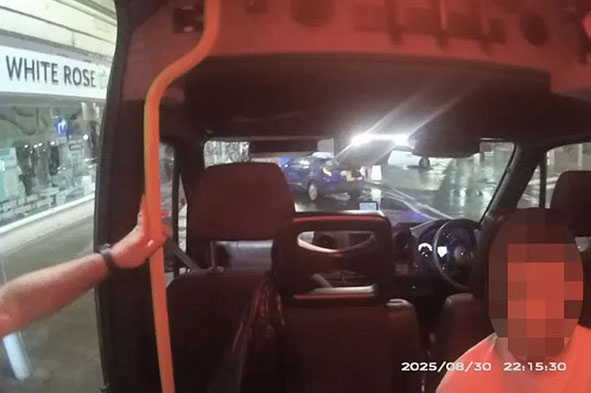
A 20-year-old man was arrested in Nottingham after an Uber driver was reportedly spat on and subjected to racist abuse. The incident took place around 9.30pm on August 30, on Victoria Street.
According to Nottinghamshire Police, an intoxicated man entered the parked Uber and demanded to be driven. When the driver explained he could only transport passengers with a pre-arranged booking, the man became aggressive.
The passenger then got out of the car, challenged the driver to a fight, and, as the driver began to record him, allegedly “hurled racist abuse and threats...before spitting at the driver.”
Officers located the suspect nearby and he was arrested on suspicion of racially aggravated common assault and has since been bailed with conditions while the investigation continues.
PC Harry Brown described the incident as “appalling.” He added: “It is simply not okay for anyone to subject anyone to racial abuse.” He said the attack left the victim “too distressed to carry on with his shift,” highlighting that “such behaviour can have a real, longstanding impact on victims.”
TAXI DRIVER ASSAULTED AND CAR STOLEN IN VIOLENT FARNBOROUGH ROBBERY
A taxi driver was violently assaulted and his car was stolen in a robbery that took place on Thursday, August 28, in Farnborough.
The incident occurred at approximately 9:55pm on Union Road, near Farnborough Main railway station. A man approached the taxi, assaulted the driver, and then dragged him from the vehicle. The suspect then stole the car, described as a white Peugeot E7 with a registration number beginning with SF15, and drove off toward Farnborough Road.
Hampshire Constabulary is asking anyone with dashcam footage from the area or who may have seen the stolen vehicle to call 101, referencing crime number 44250390373.
CHILDREN LEFT TRAUMATISED AFTER BRICK SMASHES TAXI WINDOW IN MARDEN, KENT
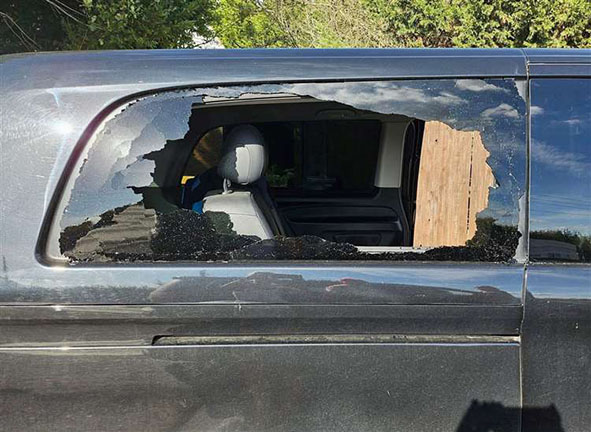
A group of schoolchildren were left “traumatised” after a brick was thrown at their taxi, smashing a rear window and covering some of the students in glass.
The incident occurred on September 8, in Marden as the taxi was returning from the school run.
Marissa McGowan’s 13-year-old son was in the taxi and had to be picked up by his mother.
She recounted the events, stating: “He had bits of glass all over him. He was sat in the seat next to the window that shattered.”
She added that her son was left “traumatised and confused by it all.”
While the taxi driver and parents reportedly called 101, Kent Police have stated that no formal reports of the incident are currently on their system.
MAN ACCUSED OF STABBING CABBIE IN LEYLAND MOVED TO MENTAL UNIT PENDING SENTENCE
A man charged with stabbing and robbing a taxi driver near Leyland has been transferred to a secure mental hospital pending a court decision on his sentence.
Phillip Dookie, 45, of Preston, appeared before a judge in Preston via a video link from prison on September 2. He faces charges of robbery, wounding, and possessing a knife.
Judge Andrew Jefferies KC adjourned the hearing until December, stating he needed more information from doctors regarding Dookie’s mental health.
Dookie was arrested after a taxi driver reported being attacked and robbed in Buckshaw Village in February. Two codefendants - a man, 37, and a woman, 31 - were also apprehended. All three were charged with robbing the victim of £70 and a mobile phone. Dookie was also charged with Section 18 wounding with intent.
During the hearing, Judge Jefferies expressed his discomfort with sentencing Dookie after hearing he was reportedly suffering from a “treatment resistant form of paranoid schizophrenia.”
Dookie had claimed he used the knife to protect his girlfriend from the driver.
The cabbie, who Dookie had made serious allegations about, had said his livelihood was now at stake because he was worried about going out to work at night.
The judge explained to Dookie: “I don’t know whether an appropriate sentence is a hospital order, a hospital order with restrictions, or prison. So reports have to be done.”
Dookie was remanded in custody to be sentenced on December 3.
TAXIBOT ANNOUNCEMENT
TAXIBOT AND iCABBi - STRATEGIC PARTNERSHIP TO REVOLUTIONISE FLEET AUTOMATION WORLDWIDE
by M2M TaxiBot
www.m2mtaxibot.com
In a landmark move set to redefine the future of taxi fleet automation, TaxiBot has officially partnered with iCabbi, the global leader in taxi dispatch technology. This collaboration brings together cutting-edge AI chatbot capabilities and a robust cloud-based dispatch platform to deliver seamless automation across fleets worldwide. The partnership is already making waves, with major UK operators such as 001 Oxford and Take Me Group adopting the integrated solution to drive customer engagement and streamline operations.
Three platforms, one seamless integration
At the heart of this partnership lies a powerful integration across three major social platforms: WhatsApp, Instagram, and Facebook Messenger. TaxiBot’s intelligent chatbot technology enables passengers to book, amend or cancel rides directly through their favourite messaging apps. This “three bots for the price of one” model offers fleets a unified, branded experience that meets customers where they already are, delivering convenience and speed with every interaction.
TaxiBot’s AI-driven system supports multilingual bookings, voice note functionality, and unlimited notifications, ensuring a premium user experience. When combined with iCabbi’s dispatch engine, which boasts 99.999% uptime and over 1,000 real-time configurations, fleets gain a fully automated, scalable solution that reduces manual workload and boosts operational efficiency.
Empowering fleets: 001 Oxford & Take Me Group
Early adopters of the TaxiBot-iCabbi integration include 001 Oxford, a leading fleet known for its commitment to innovation and customer service. By leveraging this technology, 001 Oxford has streamlined its booking process, reduced call centre dependency, and enhanced its digital presence - making it easier than ever for passengers to book rides on their own terms.
Meanwhile, Take Me Group, which operates a network of local taxi firms across the UK, has embraced the partnership to scale its operations while maintaining local autonomy. Through the Take Me network, fleets benefit from centralised support services, performance marketing, and high-converting digital platforms - all powered by iCabbi’s dispatch system and TaxiBot’s conversational AI.
This synergy allows Take Me fleets to capture users on their preferred platforms, increase lead generation and deliver consistent service standards across regions. The result is a smarter, more connected taxi experience that rivals global ridehailing apps while preserving the trust and familiarity of local providers.
Driving the future of fleet automation
The TaxiBot-iCabbi partnership is more than just a tech integration - it’s a strategic alliance aimed at trans-forming how taxi companies operate and engage with passengers. With features such as dynamic dispatch, automated billing, multifleet support, and passenger profiling, iCabbi’s platform provides the backbone for modern fleet management. TaxiBot complements this by automating front-end interactions, freeing up operators to focus on growth and service quality.
Together, they offer a complete solution that empowers fleets to:
- • Automate bookings across popular social channels
- • Optimise dispatch operations with real-time adjustments
- • Enhance customer engagement through branded, conversational interfaces
- • Scale efficiently with centralised tools and offshore support
Conclusion
As the taxi industry continues to evolve, the TaxiBot and iCabbi partnership marks a pivotal moment in its digital transformation. By combining AI-powered customer engagement with intelligent dispatch technology, fleets such as 001 Oxford and Take Me Group are setting new standards for automation, accessibility, and user experience.
This is not just the future of taxi booking - it’s happening now. And with three platforms, one seamless integration and a growing network of forward-thinking fleets, the road ahead looks smarter than ever.
IN THE NEWS
UBER’S UK PROFITABILITY AT RISK AMIDST RISING COSTS DESPITE £1BN REVENUE SURGE
Uber has cautioned it may struggle to maintain profitability in the UK due to escalating costs, despite revenues climbing by over £1bn during its most recent financial year.
The American technology giant has stated it must generate and sustain higher revenue levels whilst reducing proportionate expenditure in forthcoming years “to achieve profitability in many of our largest markets”.
Uber further noted that even if successful in this endeavour, “we may not be able to maintain or increase profitability”.
This warning, emphasised in bold text, appeared in the company’s latest financial accounts for 2024, which demonstrate revenues leaping from £5.2bn to £6.5bn.
Nevertheless, the results lodged with Companies House also reveal that Uber’s pre-tax profit in the UK dropped from £29.3m to £21.6m during the same timeframe.
Uber attributed its 24% turnover increase primarily to a rise in taxi journeys and orders via Uber Eats.
Revenue from its mobility division climbed from £4.1bn to £5.1bn throughout the year, whilst Uber Eats’ sales similarly expanded from £1.1bn to £1.3bn.
Simultaneously, the group’s cost of sales soared from £4.1bn to £5.1bn.
Regarding the 26% decline in pre-tax profit, the company explained this was chiefly due to increased administrative expenses within its Delivery UK operations.
CHESHIRE COUNCILLOR TO FACE SANCTIONS FOR BULLYING AND HARASSING LOCAL CABBIE
A Cheshire West and Chester (CWAC) councillor is set to be sanctioned after a disciplinary panel found he had abused his position in a dispute with a local taxi driver.
Cllr Simon Boone, who represents the Winsford Swanlow ward, was scheduled to appear before the council’s Standards Complaints Panel on August 19, but did not attend, citing a prior engagement.
The hearing proceeded in his absence, a decision the panel justified by the cost of postponement and the uncertainty of his future attendance. The investigation focused on two main incidents involving taxi driver David Edwards.
The first was a Facebook post from Cllr Boone’s account in February 2024, in which he referred to an incident where Edwards refused to give him and his friends a ride. In the post, Cllr Boone called the driver “very childish and unprofes-sional” and mentioned his membership on CWAC’s licensing committee, which is responsible for granting taxi licences.
The second matter involved Cllr Boone repeatedly phoning, emailing, and visiting the office of Edwards’ employer, Ian’s Taxis, to complain about Edwards’ driving. Transcripts and a video recording presented to the panel show Cllr Boone repeatedly referring to his status as a councillor and a member of the licensing committee.
The panel concluded that Cllr Boone’s conduct breached several rules of the council’s code of conduct, including those on treating the public with respect; bullying and harassment; misusing his position as a councillor and bringing his role as a councillor into disrepute.
The panel has indicated they will include a requirement for further code of conduct training and a public apology to David Edwards. The panel added that if Cllr Boone had not already resigned from the licensing committee, he would have been removed.
In a statement after the hearing, Cllr Boone denied the allegations, calling the Facebook post “a fabrication” and stating he only mentioned his council role “for openness and transparency.”
He accused the hearing of being “political manoeuvring by Labour to try and damage my reputation” and a “kangaroostyle court.”
Cllr Boone said: “I was not acting on behalf of the council, so it is impossible to bring the council into disrepute,” and added: “I have no influence on any committee as an independent councillor.”
He concluded by stating he would be appealing the decision and “will not be apologising to anyone.”
ALL THINGS LICENSING
By Mike Smith IoL and Guildford Borough Council
As the autumn and darker evenings begin to draw in after a hot and busy summer, you could be forgiven for thinking that after the publication of the Casey Report, the Government’s deadline for evidence on taxi and private hire legislation reform closing and the Supreme Court definitively clearing up the issue of private hire contracts outside of London, that all would be quiet until the Government decides how best to proceed with the inquiry.
However, after having just returned from representing the Institute of Licensing (IoL) at the Licensed Private Hire Road show, where I was very pleased to speak with trade representatives, suppliers and a couple of the brilliant PHTM team; and with the next IoL Taxi Conference fast approaching, there is still plenty of licensing news to report on.
It has also probably not escaped readers’ attention that immigration is a topic dominating the news at the moment -and not always in a good way. This is an important topic for local authorities as our goal as councils is to bring our communities together; to be inclusive boroughs and districts where people of diverse identities feel valued, respected and represented.
The taxi and private hire trade is a diverse business which helps to make it so vibrant with different communities adding to its rich make-up. We can all be proud of our nationalities and we all benefit when we learn to respect and appreciate our differences.
Also being widely reported is the possibility of a ‘Taxi Tax’ and how Chancellor Rachel Reeves is reportedly looking to introduce it in the Autumn Budget. Again, we will have to wait and see what transpires.
While readers may not be as interested with politics as I am, you’ve probably still heard about the UK Government reshuffle last month following the resignation of the Deputy Prime Minister, Angela Rayner, who held the brief for Ministry of Housing, Communities and Local Government. With local government reorganisation in full swing the process unlikely to change despite ministerial changes, we are simply too far down the line; however it may be delayed ever so slightly while new ministers are briefed and take a view.
Suffice it to say there was no change to the Transport Minister, so hopefully we won’t have to worry about going back to the drawing board whilst the Transport Inquiry takes its next steps.
Transport Inquiry publishes written evidence
On this note, the Transport Select Committee inquiry into the licensing of taxis and private hire vehicles has begun to publish the written evidence it has received.
Having had a brief look through the submission, there are submissions accepted from a range of stakeholders including the IoL, Local Government Association, licensing authorities, operators, trade associations and passenger groups.
One common theme from the few submissions I have read, and very much the feedback I received at the LPHCA event as well as the PHTM EXPO in May, was the need to have national, common standards.
The published written submissions are available on the Committee Inquiry pages at:
https://committees.parliament.uk/work/9260/licensing-of-taxis-and-private-hire-vehicles/
At the time of writing 65 submissions have been published and given that there has been such a large scale of responses to the licensing inquiry, the Committee has agreed to publish the written evidence in batches so more submissions will likely be published in due course.
The Institute of Licensing submission
As readers would expect, the IoL has submitted a comprehensive response to the Transport Committee Inquiry into the licensing of taxis and private hire vehicles, highlighting the urgent need for reform across England and Wales. The current system, governed by outdated legislation and fragmented standards, is no longer fit for purpose in a modern, technology-driven transport landscape.
At the heart of the IoL’s submission is a call for national standards that would bring consistency to licensing requirements, training, enforcement and safe-guarding. The existing framework, based on legislation dating back to the 19th century, has failed to keep pace with societal changes, technological advancements and the evolving nature of the taxi and private hire industry. This has led to significant disparities between local authorities, encouraging licence shopping and cross-border working, all of which undermine public safety and regulatory oversight.
One of the most pressing concerns is the lack of enforcement powers for licensing authorities. Vehicles and drivers licensed in one area often operate in another, leaving local authorities powerless to regulate or enforce standards. The IoL argues that licensing officers should be empowered to regulate all vehicles operating in their area, regardless of where they are licensed, and that this must be supported by appropriate funding mechanisms.
The submission also highlights inconsistencies in assessing the suitability of drivers, operators and vehicle proprietors. While statutory guidance exists, its application varies widely. The IoL’s own Suitability Guidance, revised in 2024, offers a robust framework for assessing fitness and propriety, and the Institute recommends its adoption as the basis for national standards. Barriers to information sharing between police and licensing authorities further complicate these assessments, and the IoL calls for legislative changes to facilitate better collaboration and data exchange.
Training is another area of concern. There are currently no national standards for driver training, leading to wide variation in requirements across local authorities. The IoL supports mandatory training in safeguarding, disability awareness, and County Lines exploitation, and encourages collaborative approaches to standardise training across regions.
Digital ride-hailing platforms have transformed the sector, offering benefits such as cashless payments and journey tracking, but also exacerbating cross-border issues. The IoL notes that while these platforms are subject to the same licensing requirements as traditional operators, their national reach and operational models challenge local regulatory frameworks. Reform must address these challenges without compromising safety or accessibility, particularly in rural areas where digital platforms may be less effective.
Looking ahead, the rollout of autonomous vehicles presents a significant threat to the traditional taxi and private hire sector. The IoL warns that current proposals bypass the licensing regime entirely, potentially undermining regulated services and employment. Local authorities must retain a meaningful role in approving autonomous services, and the impact on vulnerable passengers and community-based transport must be carefully considered.
The IoL also addresses the role of regional transport authorities, cautioning against centralising licensing functions at the expense of local accountability and expertise. While regional authorities may offer economies of scale, they risk losing the nuanced understanding of local transport needs and challenges.
In conclusion: the IoL advocates for a unified, modernised licensing framework that prioritises public safety, regulatory consistency and effective enforcement. Reform should be collaborative across England and Wales, with national standards forming the foundation of a fair and transparent system.
The Institute stands ready to support this work and urges government officials to engage in meaningful dialogue to shape the future of taxi and PHV licensing.
TfL proposes new licensing regime for London pedicabs
On a more immediate note with regard to legislation, Transport for London (TfL) has launched a public consultation on detailed proposals to regulate pedicabs operating in the capital. The plans follow the introduction of the Pedicabs (London) Act 2024, which gives TfL powers to license rather than ban pedicabs, responding to widespread concerns raised in an earlier consultation.
The proposed regime sets out licensing requirements for pedicab drivers, vehicles and operators, aiming to improve safety, reduce noise, and ensure professional standards across the industry.
Under the proposals, all pedicab drivers would need to be at least 18 years old, pass criminal record and medical checks, and demonstrate competence through English language and safety assessments. Drivers would also be required to wear ID badges while working and undergo regular checks to maintain their licence, which would be valid for up to one year.
Pedicab vehicles would need to be purpose-built and pass annual inspections covering brakes, batteries and other mechanical components. Converted pedal-powered vehicles would not be eligible. Owners must arrange servicing every three months and retain maintenance records for inspection. All licensed pedicabs would display a licence plate showing expiry date and passenger capacity.
To address noise complaints - particularly around amplified music - TfL proposes banning externally amplified audio from pedicabs. Internally amplified systems such as headphones or hearing loops would be permitted to support accessibility without disturbing others.
A standardised fare structure is also proposed, with charges based on journey time and a minimum fare that may vary by time of day. Additional passengers could incur extra charges, and all pedicabs would be required to accept card and contactless payments via TfL-approved devices.
Operators managing two or more pedicabs would need a separate licence, subject to character checks, proof of right to work, and evidence of good business repute. They must operate from a London-based centre with appropriate permissions and ensure all vehicles in their fleet meet TfL standards.
TfL also proposes restrictions on where pedicabs can stop, prohibiting pick-ups or drop-offs in bus lanes, on pavements, pedestrian crossings or other restricted areas. Data sharing requirements would be introduced to support compliance and enforcement.
The consultation is open until 20 October 2025. TfL encourages responses from passengers, drivers, operators and other stakeholders to help shape the final licensing framework.
To access the full consultation and submit feedback visit: TfL’s official consultation page.
IoL Taxi and Private Hire Conference, Tuesday 21 October (online)
Finally, the biannual IoL Taxi Conference returns in October with this event being held online following an earlier in person event this year.
This is the first taxi event following the publication of the Casey Report, Transport Committee Inquiry and Sefton judgement and unsurprisingly these key recent themes form the basis of what promises to be a not to be missed occasion.
I am pleased to be joining others on a panel discussion entitled ‘Reform, Reform, Reform’ where panellists will discuss the nine questions posed in the Inquiry. Also on the Panel are industry experts Dave Lawrie from the NPHTA, Steve McNamara from the LTDA, Greg Bickerdike the Licensing Manager at City of Wolverhampton and Barrister Tom Crowther KC, who chaired the inquiry into child sex abuse in Telford, Shropshire with his report in 2022 finding more than 1,000 girls had been abused in the town over a period of 30 years, amid “shocking” failures by the police and local council.
Furthermore on the agenda are sessions on driverless cars, the Supreme Court decision in the Uber, Delta and Sefton case as well as updates from the Department for Transport and Welsh and Scottish Governments.
With the taxi and private hire trade poised for change this is a critical time to ensure that everyone involved in the trade is informed so would very much extend the invitation to attend the Conference to all PHTM readers.
For full details visit: www.instituteoflicensing.org
BRIGHTON CAB TRADE VIEW
By Andy Peters, BHCTA
www.bhcta.co.uk
VAT out of hell!
After reading some of the submissions from various parties for the government’s ‘Call for Evidence - Taxis and Private Hire' I didn’t think things could get any worse. Then the next day I read that vampiresque Rachel Reeves, is looking to smack a 20% vat charge on taxi and private hire journeys that will drain the life blood out of the trade
A later report states that there is no intention to put vat on hackney fares, so I would imagine she thinks all PH companies have set fares with the company taking money directly from the customer. Or the driver collects the money from the customer and pays in all the money to the company, and then the company pays the driver. So, vat would be added to the set fare whichever way, the customer pays it
It appears that she has no idea of the different models that are used such as where the company merely acts as an agent and where drivers pay a set weekly fee and also where PHVs have meters just like hackneys do. Furthermore, some companies have mixed PH / hackney fleets. In addition to this, what will happen where there is a strictly hackney only company where an operator licence is not required?
There could be ‘Bob’s Cars’ made up of PHVs and next door ‘Pete’s Taxis’ made up of hackneys, where Bob has to apply and collect vat on fares but Pete and his drivers are happy because they don’t have to.
This is even after the recent Supreme Court case that ruled that operators/cab companies are not the ‘Principal’ (where based outside of London) and although it wasn’t a vat case this effectively clarified the vat position.
The taxi/PH trade is a massive part of public transport and should be treated no differently to trains and buses where those fares are zero-rated for vat and this should also apply to London operators as well.
It just seems yet another doom and gloom prospect for the cab trade to deal with... if it’s not one thing, it’s another!
Call for evidence
Getting back to the call for evidence, at the time of writing this my own submission on behalf of the Brighton & Hove Cab Trade Association has yet to be published online. I have had assurances that not all submissions have been processed to date via communications from the Transport Committee department. However, if you are interested in my contribution, then this can be found at:
bhcta.co.uk/call-for-evidence
Beware though, it’s eighteen pages long as I have taken the call for ‘evidence’ quite literally! Well, the way I look at it there is only one shot at this - although it doesn’t beat Uber’s twenty-three pages!
It comes as no surprise that the Uber submission backs the continuance of cross-border hiring to protect its own interests, which in-turn backs ‘predominantly out of area working’. This is because Uber claims it would leave “Over 50 thousand drivers unable to respond to demand”.
Let’s not forget that it is Uber that has caused all the chaos that we have had to deal with which has ironically given the government cause to look into a major upheaval of the trade.
Anyway, pay attention to the 50,000 figure because this is around the same number of national licences that Wolverhampton has issued. So, that’s Wolverhampton drivers sorted, who would then have to get licensed in the actual area in which they predominantly work.
I haven’t been through all of the submissions as yet, and to be honest, as I keep telling myself to get a life, I’m not sure that I want to based on the drivel that I have read so far. I noted that Unite the Union has got two submissions to date, and whilst I have my own issue with the GMB as an ex-GMB member, I feel quite smug that they have recommended the intended use policy to tackle cross-border hiring, and why? Well, I wrote the IUP for the GMB just before I left slamming the door behind me in 2020. This can still be found on-line floating around the internet ether.
However, from some of the submissions I have read it does make very depressing reading where the Deregulation Act 2015 has been blamed for where we are today with cross-border hiring when nothing could be further from the truth. I make no excuses for screaming out again that all the Act did was to clarify that the triple lock of the three licences (driver/vehicle/operator) within the same area, needs to be in place, as well as extending driver licence renewals to three years.
And talking about the triple lock, I was astonished to the point that unconsciously I found my jaw had dropped where Wolverhampton stated:
“To prevent the above Wolverhampton Council would support removing the triple lock, allowing all drivers to work for any operator and drive any vehicle. Operators should not need to apply for hundreds of licences. Licences should allow any operator to accept a booking for any licensed vehicle, driven by any licensed driver anywhere in the country. This will increase the availability of drivers and reduce costs to operators and lease companies as they only have to be licensed once.”
There are times when I would like to lock myself in a sound-proof room and have a friendly chat with the types of people who write such ridiculous things like that.
In my opinion, the only reason why Wolverhampton Council has suggested this is because it has a huge number of operators/companies licensed by Wolverhampton that are not physically in Wolverhampton. Can you guess how many cab companies there are? Over 400 for a population of around 250,00. Put that into comparison with Brighton & Hove that has a population of around 290,00 and has around 50. I wonder where all those Wolverhampton cab companies are in the city, he says tongue-in-cheek. I would imagine these are probably registered at PO Box addresses but if Wolverhampton would like to enlighten me then please do.
But for Wolverhampton to go on and suggest that any private hire driver/vehicle should be able to work for any operator anywhere without the triple lock in place is completely, and utterly irresponsible. Shame on you Wolverhampton licensing. Where is the accountability / paper trail of what the PHV driver is doing or working for?
Anyway, enough of that as it is all too depressing.
Chichester
If you have been following my previous rants you will know that we have been having a major problem with being swamped with rubber-stamped Chichester driver/PHVs flooding Brighton and Hove, who, without a care in the world illegally use our ranks.
Chichester licensing has yet to address my question of why they do not have an English Language test and do not back council controlled CCTV, the lack of which is making it the ‘soft-licensing’ centre for the south-east, to get licensed there and then head back to predominantly work in Brighton & Hove.
At the time of writing, Chichester licensing has suddenly stopped acknowledging our complaints from the last few weeks regarding their PHV drivers illegally using our ranks. These are always supplied with clear photo/video evidence, so there is no excuse to ignore us. This is even after a warning email was sent out by Chichester to all their drivers of the consequences of acting illegally.
I am also currently waiting (at the time of writing) for a promised response from the Chair of Chichester licensing as all complaints are now not only sent to Chichester licensing, but also to every councillor on the Chichester Licensing Committee, to ensure that they are fully aware of what is going on. I did have one very poor response from a licensing councillor who shall remain unnamed, but honestly you wonder how these people get onto such committees with so little knowledge of what they are actually in charge of.
Oh well.... let’s see what the government throws at us with the threat of the unknown... and what lady vampire has in mind to suck in every penny from us, so she can to fill the black hole that is now bigger then the alleged black hole that was there when she took over.
I am reminded at this point as to what the late great Kenneth Williams stated: “Oh,what’s the bloody point.”
KNOW YOUR RIGHTS
by Patterson Law
Motoring Solicitors; 01626 359800
advice@pattersonlaw.co.uk
TRIAL BY PAPERWORK
These days the vast majority of traffic offences are not dealt with by a police officer pulling someone over but instead are caught by a speed camera or dash cam, so the first the driver hears about it is when a letter comes through the door.
These letters are complex, use legal language that is not easy to understand and often don’t make the instructions clear. We regularly see drivers make errors within the paperwork that can really damage their case later down the line, as quite simply they don’t realise that they are now engaging in criminal proceedings.
Our advice always is that if you receive a letter through the post in relation to any offence at all, immediately seek legal advice.
The questions below are based around real enquiries where the initial paperwork has been an issue.
CASE 1
Question: Hi, I have received a Single Justice Procedure Notice after allegedly being involved in a hit and run. Which is a plain lie. I have never been involved in any such thing!!
Back in March it is alleged that I clipped a parked vehicle with my wing mirror and did not stop or report the matter to the police.
I received a letter from the police accusing me of the hit and run and I immediately responded to confirm that I hadn’t been involved in any collision at all. They responded to say that I still had to nominate the driver, but they ignored everything I said. I was not going to incriminate myself by giving them all of my details so I wrote back and told them to take me to court.
But now the only charge against me is “failing to provide driver information”. They’re not even charging me with the hit and run anymore!! Is this something you can help with?
Answer: When a ‘hit and run’ is committed, the first thing the police need to do is identify the driver, and so they write to the registered keeper of the offending vehicle asking them to nominate the driver. If the keeper does not nominate, they are charged with failing to provide driver information. It sounds like that’s what's happened in your case.
What you should have done is nominate yourself. Nominating yourself is not an admission of guilt. You could have nominated yourself and still defended the charges by denying fault.
However, now you have simply been charged with failing to nominate, so we must look at why you did not nominate yourself as the driver. You may struggle to defend the charge if it was you driving, but you had simply refused to nominate yourself.
Outcome: In this particular case, the defendant was extremely fortunate in that whilst he hadn’t filled out the police form nominating himself, he had nominated himself in his letters. In his long responses to the police he had said that he accepted driving the car and he signed it. He’d also fortunately put the response on his personal headed paper, which had his full name and address on it.
So even though it wasn’t on the form that they provided or all in one place, he had actually given a signed letter with his full name, address and an admission to being the driver.
We managed to persuade the court that according to the case of DPP v Jones, a signed covering letter with all requested details is deemed an acceptable response, and the police in this case simply missed it. He was acquitted of the charges.
But if he hadn’t had signed the covering letter (which a lot of people don’t), or hadn’t responded on headed paper, he wouldn't have fulfilled his duty and he would have been facing 6 points and up to £1,000 fine.
CASE 2
Question: I was recorded speeding at 24mph in a 20mph zone and was offered a speed awareness course. But I read the form wrong and I accidentally paid for the fixed penalty of 3 points and a £100 fine instead of the course. And now the police are saying it’s too late to reverse that. Is there anything you can help with?
Answer: Unfortunately not. Once you accept a fixed penalty, whether intentionally or not, that is the end of the matter and there is no automatic legal process to get it reopened. So you are stuck with the points I am afraid.
Outcome: Obviously, this person didn’t instruct us as there was nothing we could do, but this is a question that we get asked regularly. When a minor speeding offence is committed, as long as the driver hasn’t done a course in the last three years and it’s within the speed threshold, they should be offered the chance to do a speed awareness course.
However, that offer comes on the same letter as the offer of a fixed penalty of 3 points and a £100 fine. The driver has to accept one or the other. But if you select the wrong option, it’s too late. So, it is imperative that prior to accepting anything and giving the police any money, you are absolutely certain what you are paying for and what you are agreeing to do.
CASE 3
Question: I have a charge for using a phone whilst driving. I was not pulled over, I only heard about this when I got a letter a few days after. I responded to admit I was driving and then I was offered 6 points instead of court, but I have 6 points already so the police told me I couldn’t accept that.
So now they’ve sent me a court letter. I have the paperwork and the witness statement if you would like me to send it. It has the police statement with it. There’s just one police officer at traffic lights who says he saw ‘what looked like a phone’ in my hand. He says he couldn’t see what I was doing with it. There is no evidence. Surely that is not enough and I’ve got good grounds to defend this?
Outcome: This was a very interesting case, as again it highlights exactly why you ought to take legal advice at an early stage of the proceedings.
This person had received a Notice of Intended Prosecution a few days after allegedly being seen by the officer. He responded nominating himself as the driver, and was then offered a fixed penalty of 6 points and a £200 fine. He tried to accept the offer, but at the time of the offence he had 6 points on his licence already, so he was at risk of being banned for 6 months for ‘totting’ 12 points within 3 years. The police therefore ‘rejected’ his acceptance and wrote to him to tell him that he was going to end up in court for the Magistrates to consider banning him from driving.
In response, he wrote to them to apologise for using his phone. He explained that he was just reading a text message from his sick mother and he asked if he could do a course instead. The police refused.
When the case got to court, whilst we advised him that we agreed the officer didn’t actually see him use the phone at all, and he would have had a good case, he had made a full written admission apologising for using his phone whilst he was driving.
Anything you say can be used against you in evidence. And in this case the police were relying on that admission as proof that he was using his phone. So he ended up pleading guilty.
It worked out well in the end because with our help, we managed to persuade the court that a disqualification would cause exceptional hardship, and so they didn’t ban him. However, had he not made that written admission to the police, there may well have been no evidence against him and he could have been walking away with no points at all.
If you need any advice on motoring matters or you have any questions about the proposals and how they could affect you, please email: advice@pattersonlaw
WORLDWIDE TAXI FOCUS
from South Africa
DRIVER FLEES AFTER TAXI PLUNGES OFF BRIDGE, INJURING 20 CHILDREN
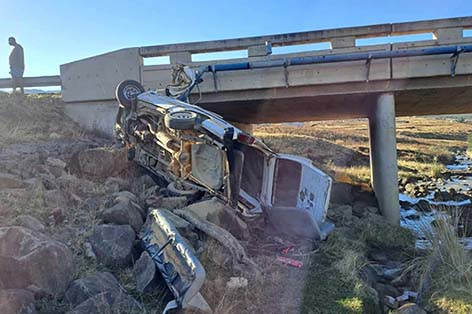
A driver is on the run after a minibus taxi veered off a bridge in KwaZulu-Natal, injuring 20 schoolchildren. The incident occurred on Monday morning 15 September, when the taxi plummeted several metres from the KwaKhetha Bridge on the P127 leaving families in shock and communities calling for urgent action on road safety.
Paramedics arrived fast, working hard to free the trapped kids and give first aid right there. Some learners had cuts, broken bones, and head injuries, with a few in serious shape. They were loaded into ambulances and rushed to hospital.
This is the third such accident in the Umgungundlovu District in just four days. The province is still recovering from a tragic crash the previous Thursday where four pupils died and several were injured after a taxi’s brakes allegedly failed, causing it to plough into a crèche.
The MEC for Transport has called on the South African National Taxi Council (Santaco) to address the high rate of accidents involving taxi associations. He highlighted grim statistics, noting: “The Automobile Association estimates 70,000 minibus taxi crashes annually, with taxis experiencing double the crash rate of other passenger vehicles.”
from Greece
GREEK CABBIES LAUNCH 48-HOUR STRIKE, PARALYSING ATHENS
Taxi drivers across Greece began a 48-hour strike at 6am on 8 September, protesting a new government measure they claim threatens their livelihood. The strike, organised by the Attica Taxi Drivers’ Union (SATA), is described as a “warning” and could be extended if the government does not reverse its decision.
The drivers are specifically protesting a new ministerial measure that allows vans to be used for passenger transport services. The union argues that this regulation favours “large companies and multinational platforms at the expense of self-employed taxi drivers.”
SATA president, Thymios Lyberopoulos, accused the government of “undermining” the taxi sector for six years and siding with “cartels and business interests.”
In its official announcement, SATA called the new regulation “unacceptable and destructive.” The union’s demands include the immediate withdrawal of the new decision, an end to what it calls “unfair advantages for multinationals and digital platforms,” and the protection of professional taxi drivers. The union is also calling for fair taxation and a solution to other long-standing industry problems.
from Japan
HYDROGEN-POWERED FUTURE FOR TOKYO WITH NEW TAXI FLEET
Tokyo Metropolitan Government & Toyota Motor Corporation have launched the TOKYO H2 Project, an initiative to establish the city as a global hub for hydrogen technology. The project, announced on September 3, centres on integrating hydrogen fuel cell electric vehicles (FCEVs) into the city’s taxi fleet.
Toyota has begun introducing its Crown FCEV into Tokyo’s taxi ranks, with a target of 200 vehicles by fiscal year 2025 and an ultimate goal of 600 hydrogen cabs by 2030. The partnership goes beyond simply deploying cars, as it includes funding for new fuelling stations, mobile refuelling trucks, public surveys, and realtime availability dashboards to “demystify hydrogen.”
Toyota sees the initiative as an opportunity to showcase its leadership in hydrogen fuel cells and as a “living testbed” for strengthening supply chains and building global expertise.
A critical component of the project is the development of a robust hydrogen infrastructure - new fuelling stations are being built across central Tokyo, and mobile hydrogen trailers are on standby to support the growing fleet.
from Spain
NEW CATALAN LAW PAVES WAY FOR END OF RIDE-HAILING IN BARCELONA
Barcelona is preparing to phase out app-based ride-hailing services following a new transport law introduced by the Catalan government. The legislation will gradually eliminate around 600 urban VTC (PHV) licences in the metropolitan area, with the remaining 300 allowed to operate until their permits expire. The measure, set to take full effect by the end of 2026, is expected to reshape how visitors move around the city.
The initiative seeks to resolve years of tension between taxis and VTC companies while ensuring that taxis remain Barcelona’s primary regulated service.
A new model will apply to VTC operations requiring bookings at least two hours in advance, and for vehicles to remain available to the customer for one hour. The rules effectively end the on-demand convenience that made ride-hailing popular.
Taxis will remain widely available and under the legislation, taxi drivers will face stricter rules prohibiting them from rejecting lower-fare trips in favour of longer, more profitable ones.
The government says this will create a fairer system for passengers, ensuring tourists are not turned away or overcharged for short rides.
Authorities also plan to create a geolocation platform to track taxis and VTCs in real time. Vehicles will be fitted with monitoring devices, allowing regulators to detect unmet demand and, if necessary, issue additional taxi licences. This system could help improve service reliability for visitors during peak travel seasons and special events.
from Australia
BUSINESSMAN SLAMS “OUT OF CONTROL” SYDNEY CAB DRIVERS
A Sydney businessman, Scott Kuru, has sparked a heated debate online after an “extraordinary tirade” against taxi drivers, whom he accused of being “out of control” and operating like a “mafia.”
In a video posted to TikTok, Kuru claimed that he was repeatedly refused a short trip home from Sydney Airport by multiple drivers. He said he was “begging and pleading” for a driver to accept his fare. Kuru’s frustrations were fuelled by what he called “Sydney’s Taxi Crisis,” where drivers allegedly refuse short trips, overcharge, and make up “fixed fares” on the spot.
His sentiment was echoed by many social media users who shared their own negative experiences. One wrote: “Airport to Vaucluse they slugged me $120 for a 25-minute trip. Rip-off.” Another user from Melbourne said a driver refused to use the meter for a short, three-minute trip and tried to charge them $85, while an Uber ride for the same journey was only $11.
In an effort to combat this issue, the NSW Minns Labour Government is set to introduce a trial of a $60 flat-rate fare from the airport to the Central Business District, beginning on November 3.
This initiative comes after the NSW Point to Point Commission received frequent complaints of travellers being charged more than $150 for the 13-kilometre journey. Since November 2022, a taxi fare hotline has resulted in over 1,100 fines being issued to taxi drivers
from India
PASSENGERS SURVIVE AS BOULDER CRUSHES TAXI IN INDIA

A major accident was narrowly avoided on the Nainital-Haldwani road in India when a large boulder fell onto a moving taxi. The vehicle, which was carrying two health department officials en route to the Nainital High Court from Haridwar, was significantly damaged.
Despite the impact, both passengers miraculously escaped with no serious injuries, according to reports.
The incident temporarily disrupted traffic on the road. Following the event, Vivek Rai, the ADM of Nainital, issued a public warning: “appealed to the people to be cautious while driving on hilly roads during the rainy season and avoid unnecessary travel.”
BERNIE THE BOOK
C’EST OCTOBRE, C’EST PARIS... IT’S THE ARC
Europe’s richest race takes place at the weekend, the Prix de L’arc de Triomphe in Paris and I can’t wait! - you might find me in the Moulin Rouge on Saturday and quaffing oysters from my winnings on Sunday evening!.. well you can wish n’est pas?
It also has had a fascination, nay obsession for the Japanese and this year I can see success, after many years of trying for the far east, with the hugely impressive BYZANTINE DREAM at a whopping 12/1 in what looks a very open affair. His trial in one of the stronger trials - the Prix Foy could hardly have gone better and the way he extended to the line left me in no doubt to his abilities. Put the Yen down now and enjoy the sushi.
The master of Ballydoyle seems to be prodding the bear all summer long with a first choice selection, but the picture is no less clear and the one horse I think will challenge my selection is AVENTURE, who came second last year and who also looked super impressive in the Vermeille and who is currently the 11/2 second favourite.
Back both with confidence and pass the Tabasco (for the oysters!)
MAJOR LEAGUE BASEBALL
Its not just Gridiron that I watch or bet on. No, its baseball too!! And this month sees the conclusion to the World Series. Last years runners up the NEW YORK YANKEES have stuttered all year with long-term injuries to their two main pitchers and without them they’re in deep trouble. But a recent upturn in fortune coinciding with a semi-return has seen them challenge for the American League East. These next few days will determine if they qualify for the post-season as divisional winners or wild cards, but no matter because the 9/1 on offer is extremely generous and has to be taken. Take it now.
SUPER LEAGUE
Changing continents again, October also sees the conclusion to Rugby League’s Super League, with this next weekend seeing the semi final stage. All year long (and tipped up in June by Yours Truly) HULL KR have been the dominant team and I see no reason to desert them now. They won the Shield and now are No 1 seeds in the Playoffs. Unbelievably they are 9/4 second favourites behind perennial Old Trafford visitors Wigan, but I can only see one result.
POLITICS
Harold Wilson once famously said that a week was a long time in politics and this tumultuous Autumn could hardly been any worse for Keir Starmer... or could it?? With the Labour Party Conference taking place now, could we see a stalking horse emerge?
So on that subject and on the next Labour leader market (whenever that is, either at a General Election or an internal heave -ho) the Book has had a small interest on ANDY BURNHAM at 4/1 (if he stands for Parliament soon his price will plummet to 6/4) and ANGELA RAYNER at 16/1 as a left wing backlash - if only someone could do something about her dress sense...and diction!!!
If Lucy Powell wins the election for Deputy, the Left will only get stronger.
STRICTLY!
Away from sport and under the umbrella of a bet is a bet, SCD has launched, or rather twirled with a tango, and looking at the odds it is hard not to see why Lewis Cope is favourite, what with his Billy Elliot background. But the best dancer rarely wins and I prefer the chances of Olympic sprinter and Gladiator HARRY AIKINES-ARYEETAY (scores 25 at Scrabble!) at a tempting 13/2. Big personality, big pecs, big chance.
Until next time
Good Punting
Bernie the Book


